Vores stæmmer er framtidsdrømme
Our voises carry futur dreams
2025 | large-scale installation | exhibited | Gloria’s foyer Roskilde Festival 2025; GRASP 2025
including
facade | 30 x 7 m | Vores stæmmer er framtidsdrømme (Our voises carry futur dreams)
8 wall-mounted works | 122 x 170 cm | Dyslektiske styrker er frø vi vil så (Dyslexic strengths are seeds we will plant)
12 seating elements | 120x120 cm | Lovforslag: Ordblinde med stolthed (Legislative proposal: Dyslexics with pride)
sculpture | 4 m | Gummifinger 1 (Elastic finger 1)
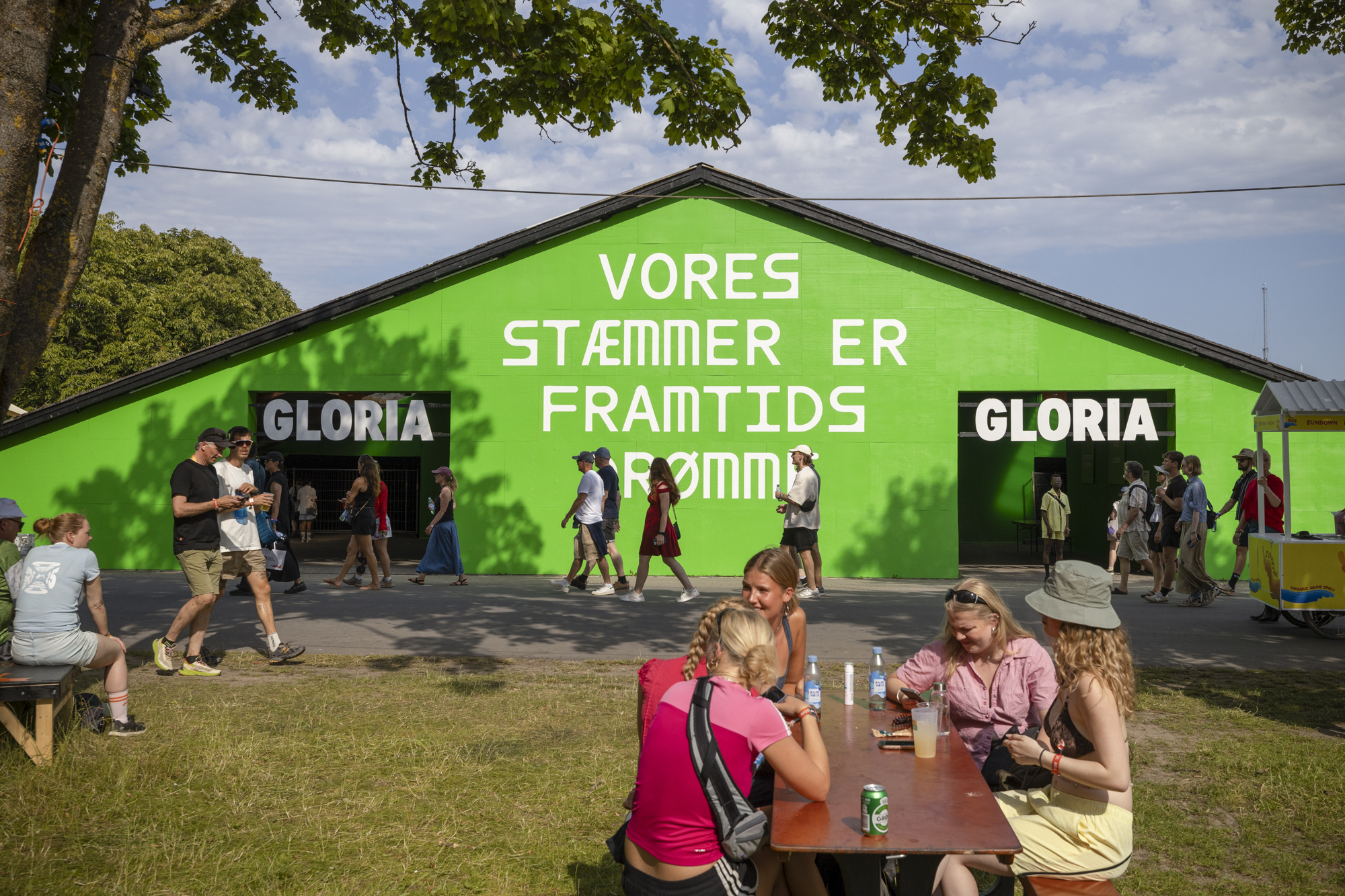
Visual artist Julie Nymann invites us into an installation where green surrounds us. People who have difficulties converting sound into words and vice versa are, in the National Danish Dyslexia Test, labelled with the colour red.
Nymann questions this colour coding, and wonders what it means for our self-understanding when we are categorised with a colour that signals ‘danger’ and ‘warning’?
Using green as the dominant colour, Nymann challenges the stigma and prejudices often associated with dyslexia, shifting the focus toward the strengths and advantages of being dyslexic.
Nymann questions this colour coding, and wonders what it means for our self-understanding when we are categorised with a colour that signals ‘danger’ and ‘warning’?
Using green as the dominant colour, Nymann challenges the stigma and prejudices often associated with dyslexia, shifting the focus toward the strengths and advantages of being dyslexic.

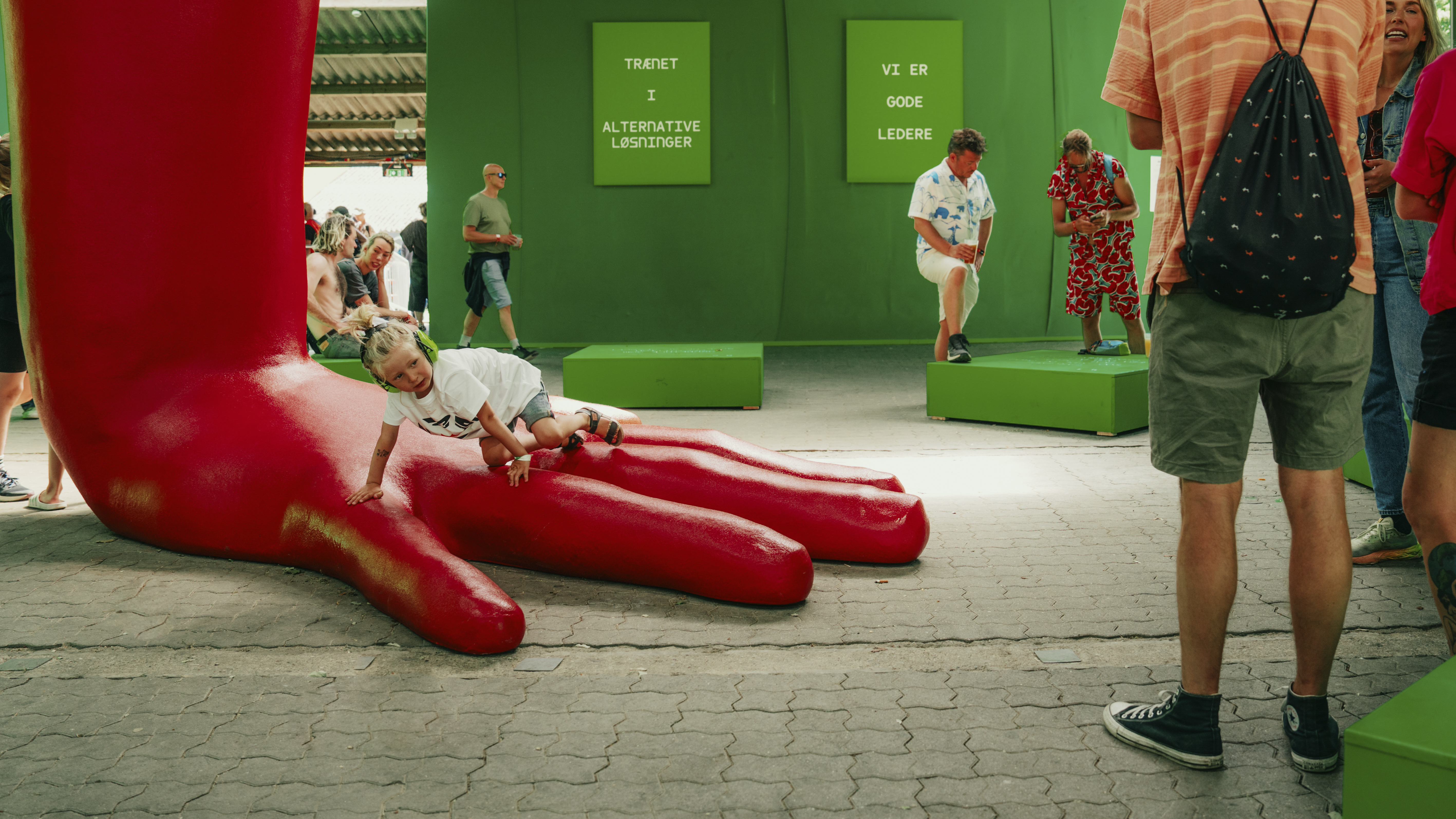
At the centre of the room rises the four-metre-tall red hand, Elastic Finger 1, with its palm pressing against the ground. The sculpture is a 3D scan of a child’s hand and functions both as a sculptural element and interactive seating spot.
The work was inspired by Nymann’s extensive research into the history of dyslexia in Denmark, where parallels were drawn to physical traits such as “rubber fingers,” as described in the alternative practitioner Kaare P. Johansen’s essay It’s in the Fingers (Politiken, 2002). These outdated perceptions and alternative treatments, which Nymann also personally experienced as a child, often reinforced feelings of inadequacy.
The installation on Roskilde Festival’s Gloria Stage, surrounded by green furniture and slogan posters, reflect both historical misunderstandings and a forward-looking, positive approach to dyslexia, emphasizing strengths and community.
The work was inspired by Nymann’s extensive research into the history of dyslexia in Denmark, where parallels were drawn to physical traits such as “rubber fingers,” as described in the alternative practitioner Kaare P. Johansen’s essay It’s in the Fingers (Politiken, 2002). These outdated perceptions and alternative treatments, which Nymann also personally experienced as a child, often reinforced feelings of inadequacy.
The installation on Roskilde Festival’s Gloria Stage, surrounded by green furniture and slogan posters, reflect both historical misunderstandings and a forward-looking, positive approach to dyslexia, emphasizing strengths and community.
On the surrounding seating, you will find Legislative proposal: Dyslexics with pride, an artistic manifesto, written as a Danish legislative proposal.
The proposals call for changing the terms and symbols that authorities and educational institutions use about people with dyslexia, as well as how the school system should be changed to better support dyslexia in literacy education.
One proposal is to move away from the Danish term “word-blindness.” Many other countries use the term dyslexia, which the artist herself also uses. Another is to eliminate the red, yellow, and green colour coding from the National Danish Dyslexia Test to help reduce stigma and feelings of inadequacy.
The proposals call for changing the terms and symbols that authorities and educational institutions use about people with dyslexia, as well as how the school system should be changed to better support dyslexia in literacy education.
One proposal is to move away from the Danish term “word-blindness.” Many other countries use the term dyslexia, which the artist herself also uses. Another is to eliminate the red, yellow, and green colour coding from the National Danish Dyslexia Test to help reduce stigma and feelings of inadequacy.
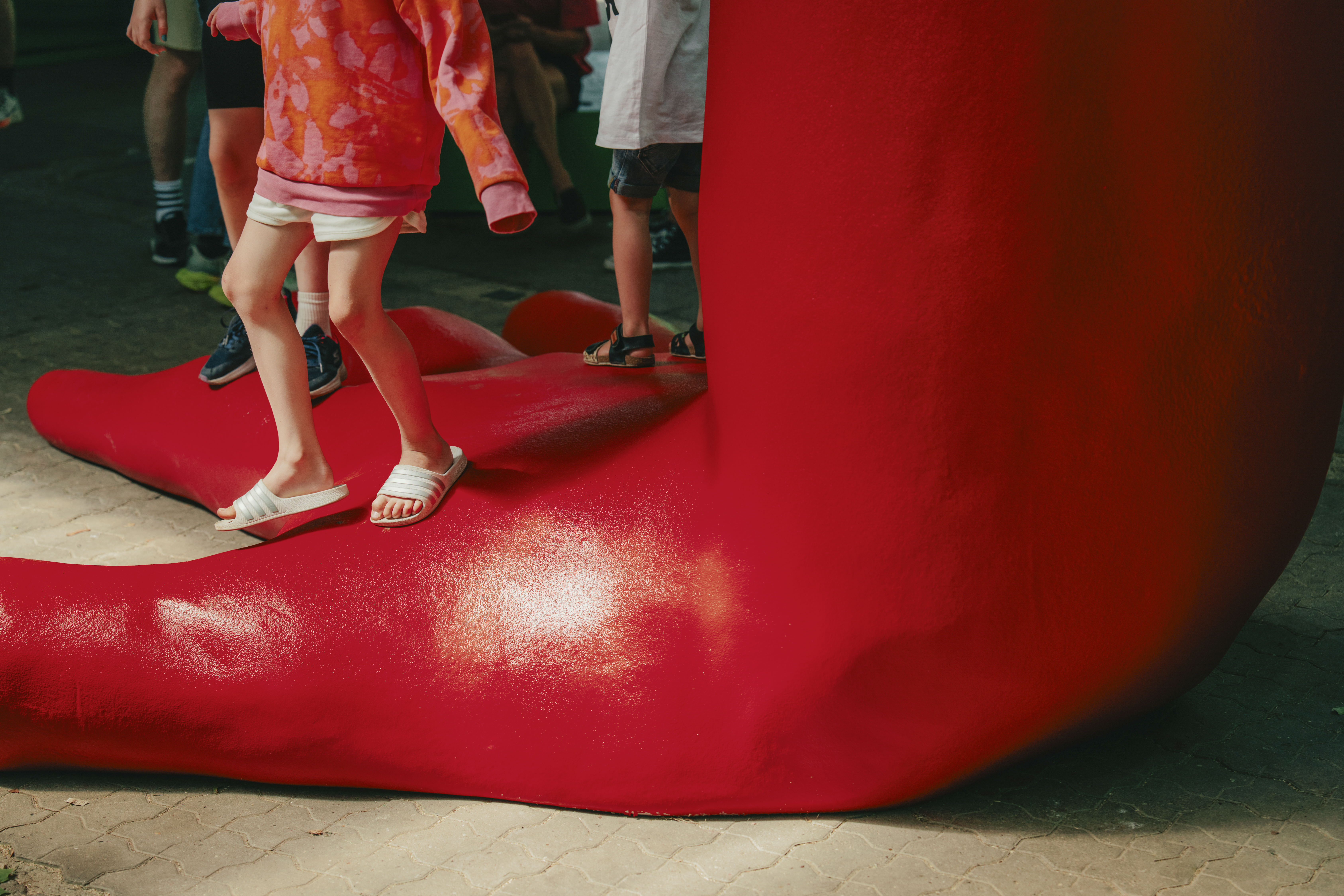
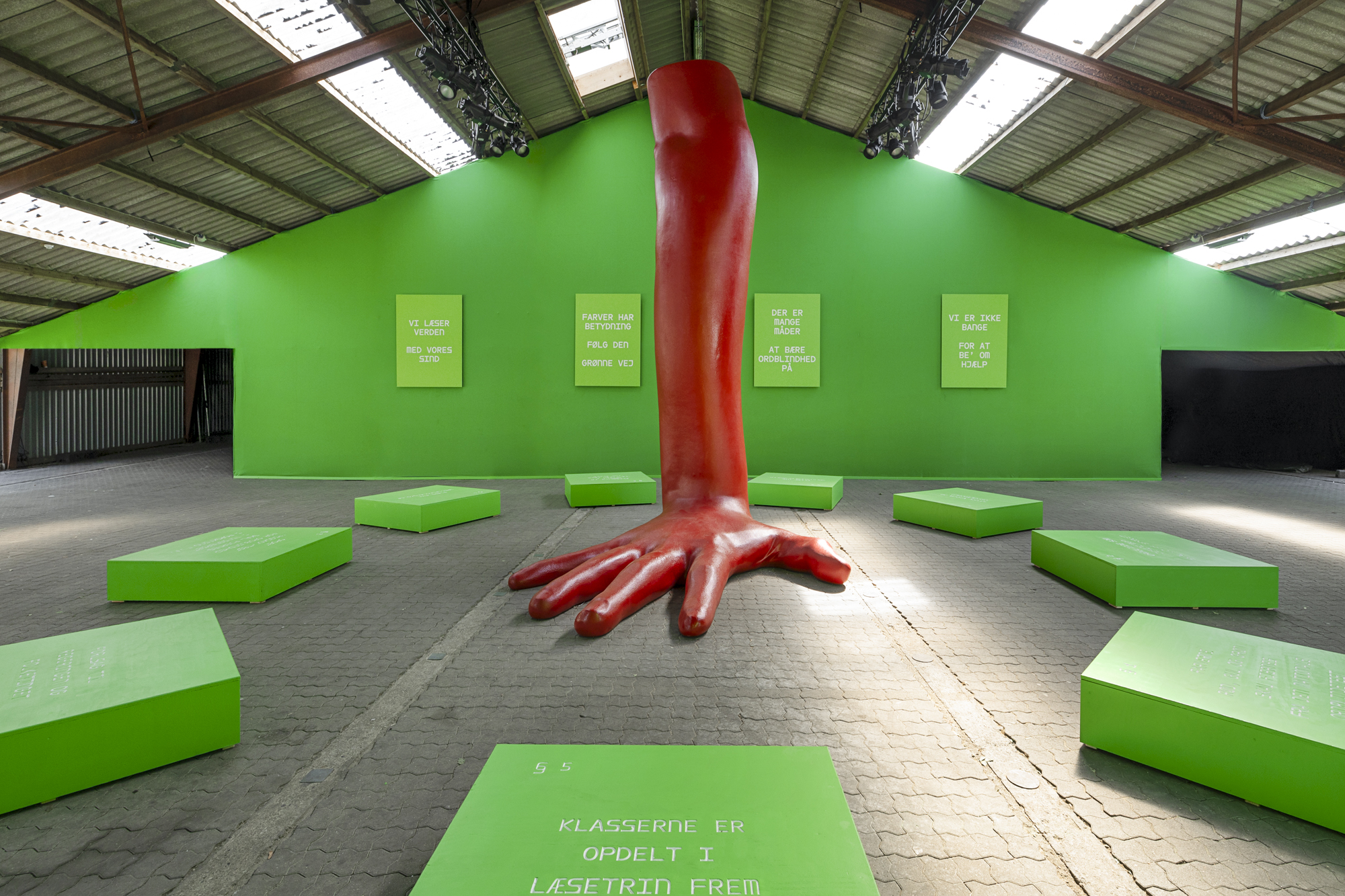
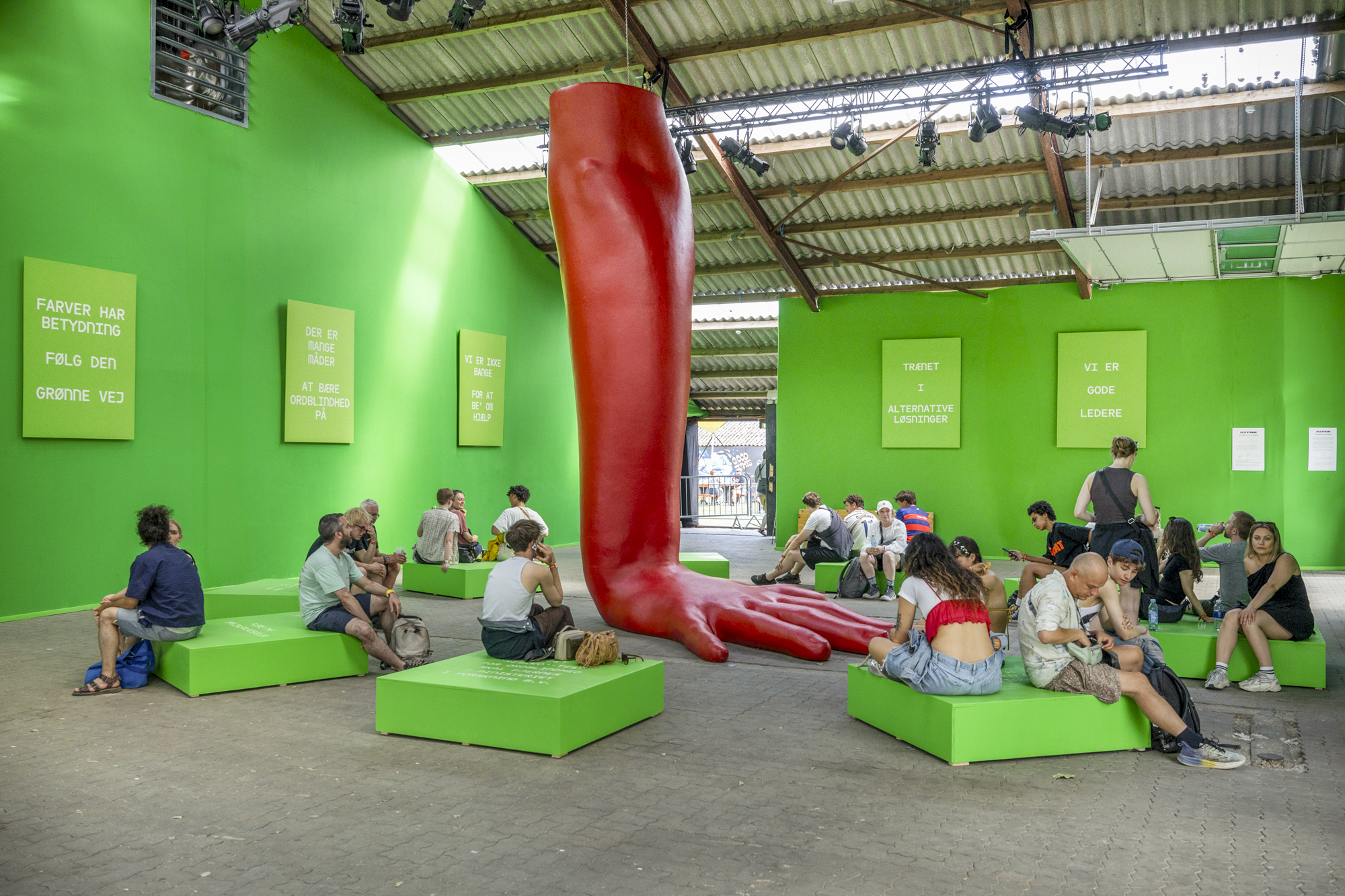
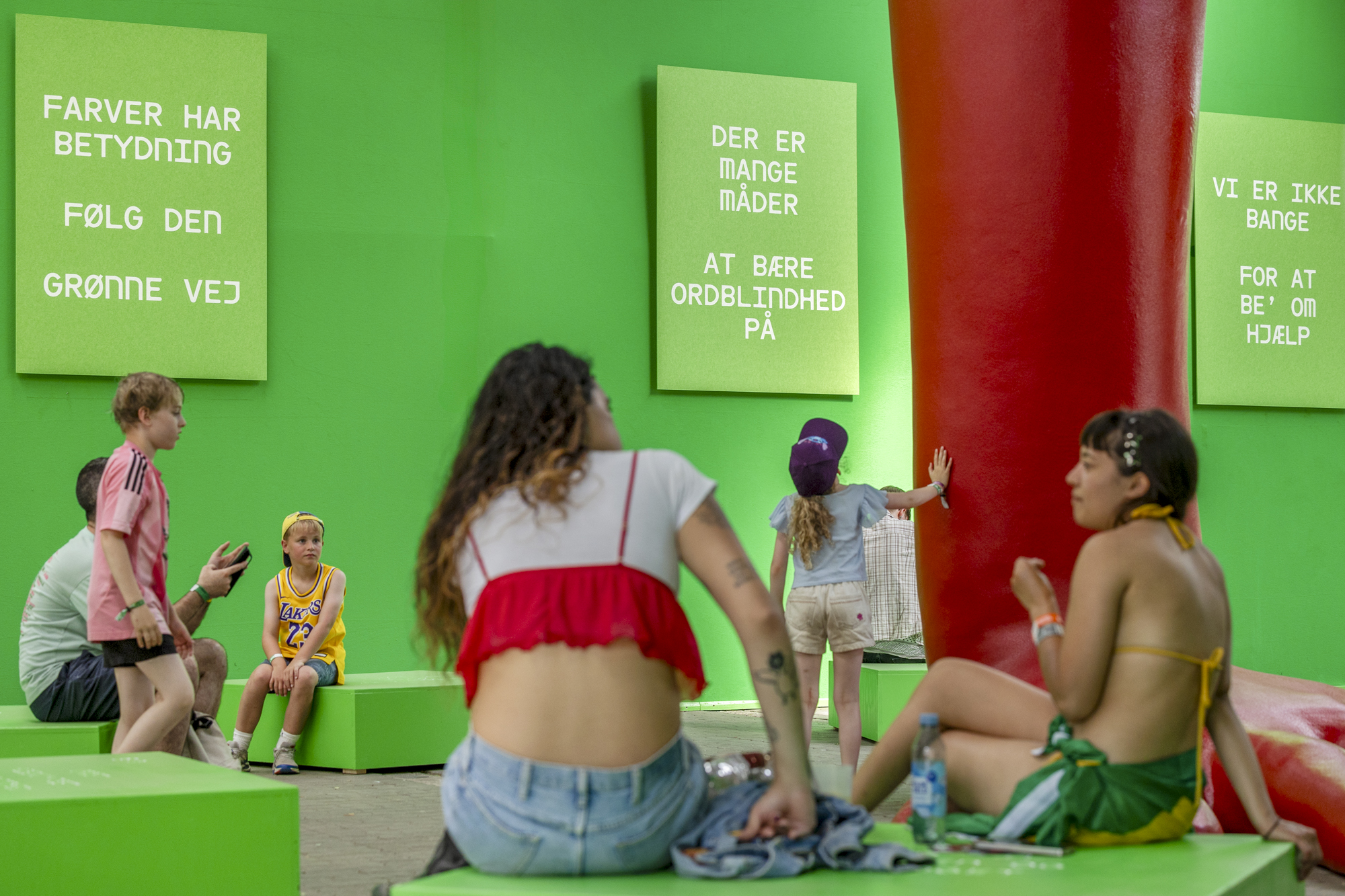
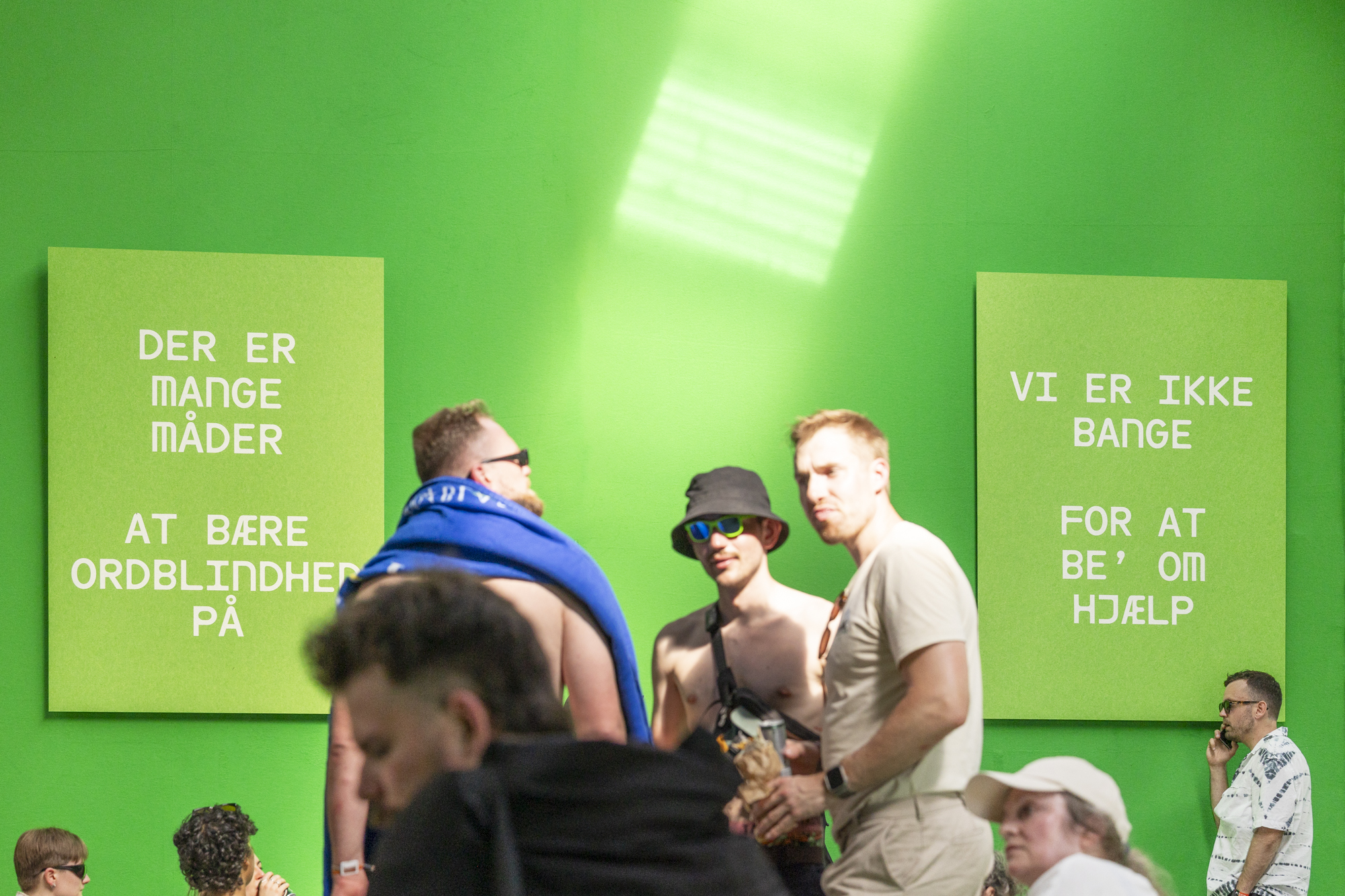

Nymann lives with dyslexia and has asked 80 other people what advantages they see in their own dyslexia. The focus on these strengths is expressed in the hanging wall pieces Dyslexic strengths are seeds we will plant.
The voices form a collective expression that recognises the different skills people with dyslexia develop to navigate a society that is not designed for everyone, such as leadership, perseverance, and the courage to ask for help.
At the same time, there is a collective call for all of us: to walk the green path together, recognising our differences as individuals and embracing the unique strengths they bring. What would happen if we turned it around and instead used a colour that symbolises strength?
The voices form a collective expression that recognises the different skills people with dyslexia develop to navigate a society that is not designed for everyone, such as leadership, perseverance, and the courage to ask for help.
At the same time, there is a collective call for all of us: to walk the green path together, recognising our differences as individuals and embracing the unique strengths they bring. What would happen if we turned it around and instead used a colour that symbolises strength?
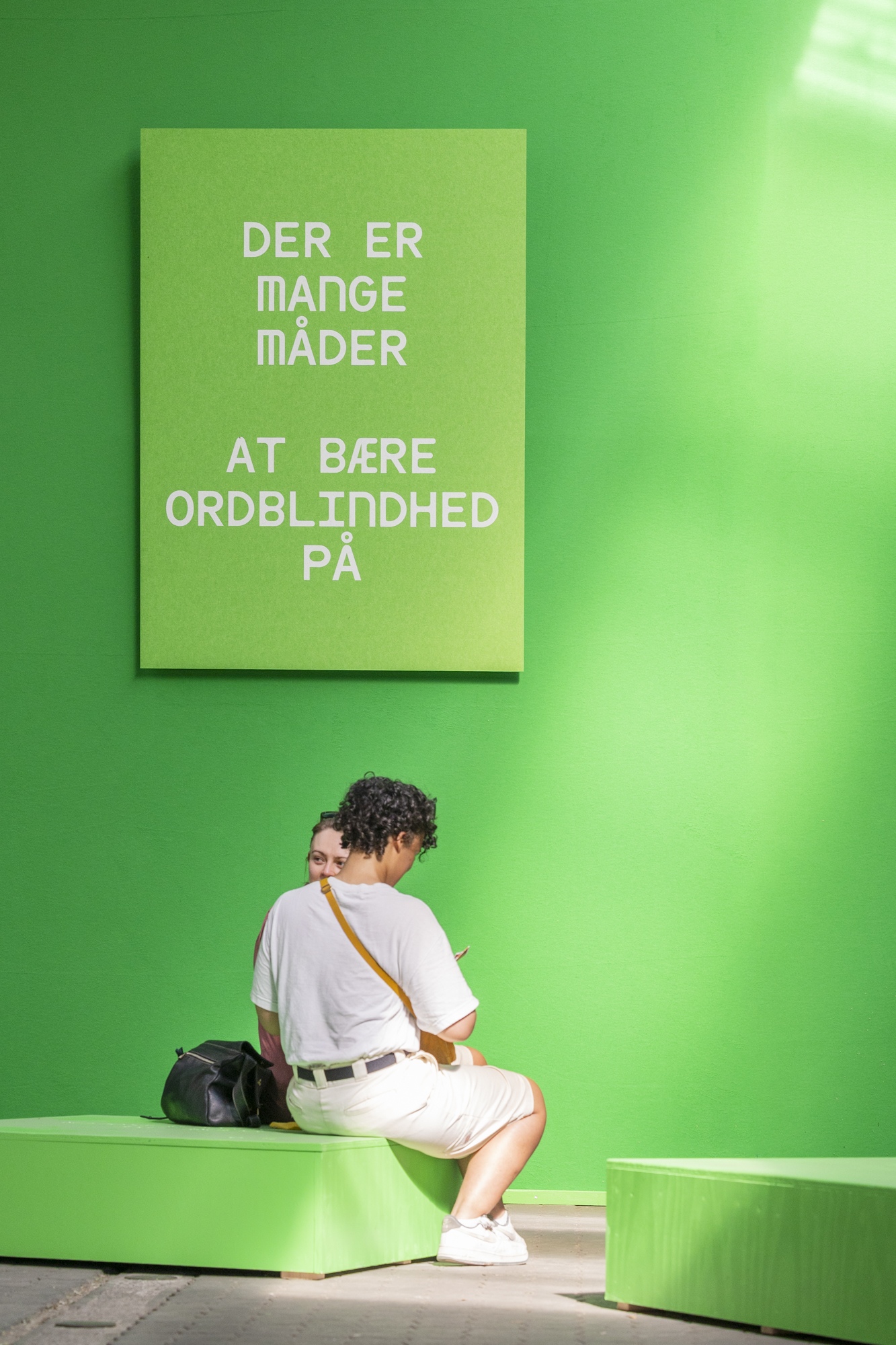
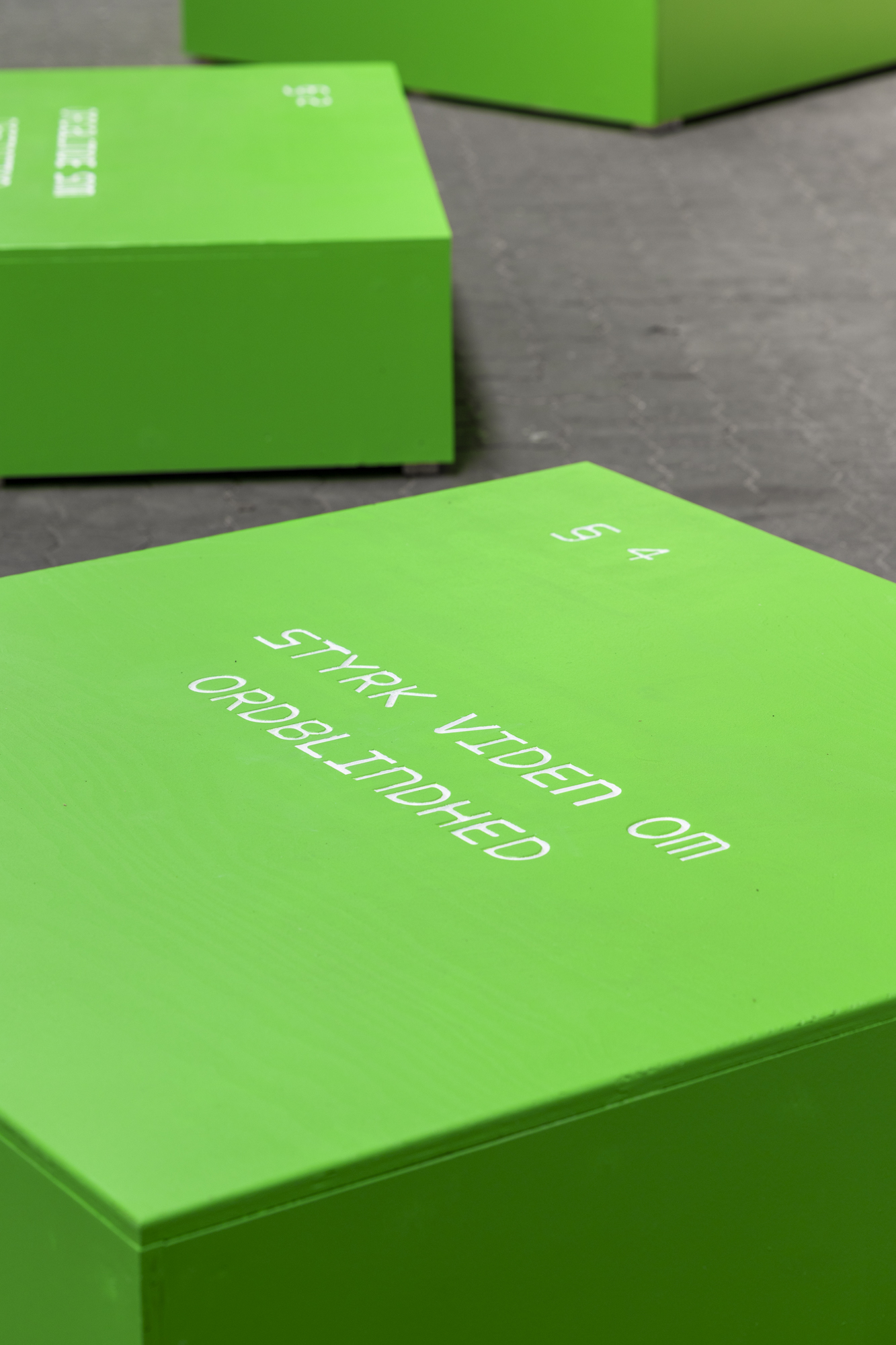
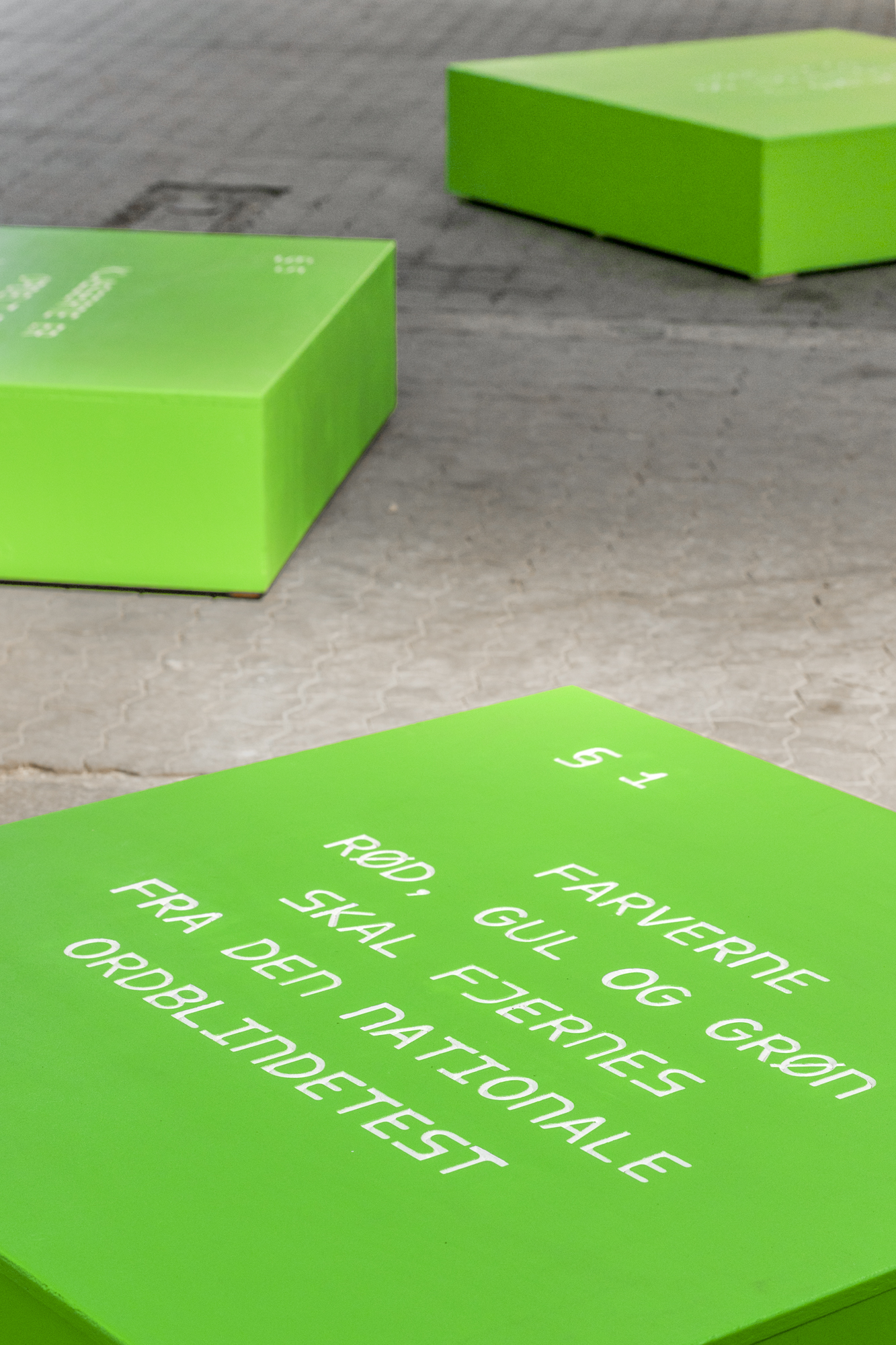
Installation view at Gloria’s foye Roskilde Festival 2025. photo Frida Gregersen
CREDITS
artist
Julie Nymann
Production Lead
Kristine Bech Sørensen
Grafisk Design
Louis Montes
Typeface
ABC Dinamo
Sculpture
Wow Factory
Install team
Tilda Lundbohm, Noah Holtegaard, Alda Mohr Eyðunardóttir, Stine Reitz, Rolf Drewsen, Lars Buchholtz, Nikolaj Phillipsen, Sofie Bymar, Sine Brik
Special thanks
Torso Electronics
Communications Strategic Rytter & Denke
Studio
Karina Lykkesborg, Pauline Koffi Vandet, Katinka Saarnak, Malou Solfjeld
Julie Nymann
Production Lead
Kristine Bech Sørensen
Grafisk Design
Louis Montes
Typeface
ABC Dinamo
Sculpture
Wow Factory
Install team
Tilda Lundbohm, Noah Holtegaard, Alda Mohr Eyðunardóttir, Stine Reitz, Rolf Drewsen, Lars Buchholtz, Nikolaj Phillipsen, Sofie Bymar, Sine Brik
Special thanks
Torso Electronics
Communications Strategic Rytter & Denke
Studio
Karina Lykkesborg, Pauline Koffi Vandet, Katinka Saarnak, Malou Solfjeld
Institutional Collaborations
Roskilde Festival & Art Hub Copenhagen
Head of Art & Activism
Sarah Staalhøj
Head of Art Production
Martin Ilsøe
Curator
Andrea Mæland
Choir Communication
Sarah Pihl Petersen,Thea Møller Jensen
Special thanks
The Behind-the-Scenes Team
Supported by
Roskilde Festival, Art Hub Copenhagen, Statens Kunstfond, Statens Værksteder for Kunst, Dansk Tennis Fond, Honoré Fonden, Den Hielmstierne-Rosencroneske Stiftelse, BUPL’s solidaritets- og kulturfond, Messetæpper og Flügger
Roskilde Festival & Art Hub Copenhagen
Head of Art & Activism
Sarah Staalhøj
Head of Art Production
Martin Ilsøe
Curator
Andrea Mæland
Choir Communication
Sarah Pihl Petersen,Thea Møller Jensen
Special thanks
The Behind-the-Scenes Team
Supported by
Roskilde Festival, Art Hub Copenhagen, Statens Kunstfond, Statens Værksteder for Kunst, Dansk Tennis Fond, Honoré Fonden, Den Hielmstierne-Rosencroneske Stiftelse, BUPL’s solidaritets- og kulturfond, Messetæpper og Flügger
Korperformance: Fordelene ved at være ordblind
Choir performance: Advantages of being dyslexic
2025 | 30:00 min sound installation and choir performance | Platform Stage Roskilde Festival 2025
Choir performance: Advantages of being dyslexic is a 30-minute immersive multi-channel sound installation including a live performance of the song A united union.
At Platform, her sound installation Advantages of being dyslexic offers a playful and immersive listening experience with different voices, personal stories, and a live choir.
The performance amplifies the many ways dyslexia is experienced and celebrates the power of community.
At Platform, her sound installation Advantages of being dyslexic offers a playful and immersive listening experience with different voices, personal stories, and a live choir.
The performance amplifies the many ways dyslexia is experienced and celebrates the power of community.
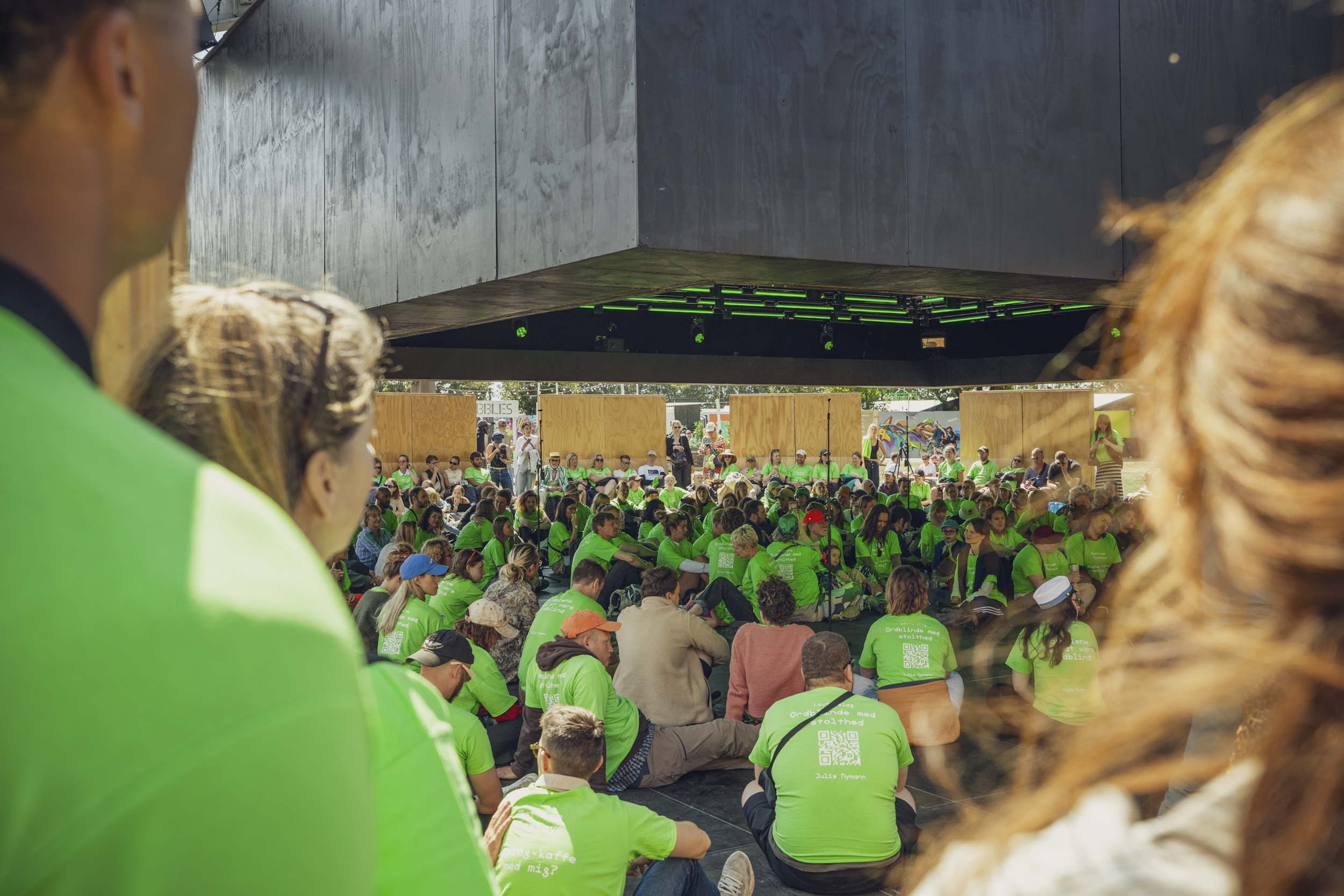
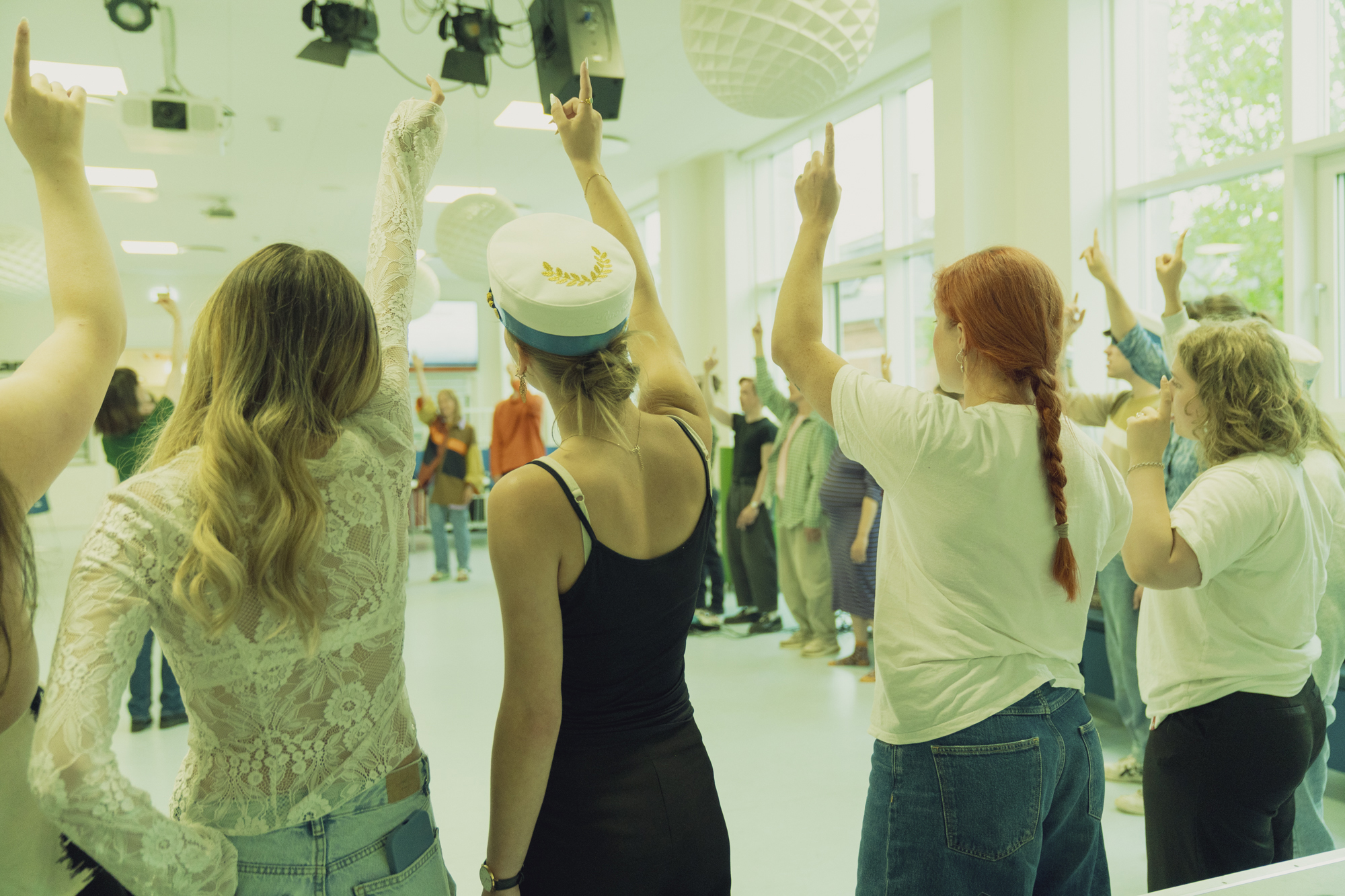
The original song is written by Julie Nymann in collaboration with Agnes Valbjørn Stavnsberg.
The performance was created in collaboration with choirleader and conductor Mette Damm.
The choir included VUC Roskilde students with lived experience of dyslexia and professional singers.
The performance was created in collaboration with choirleader and conductor Mette Damm.
The choir included VUC Roskilde students with lived experience of dyslexia and professional singers.


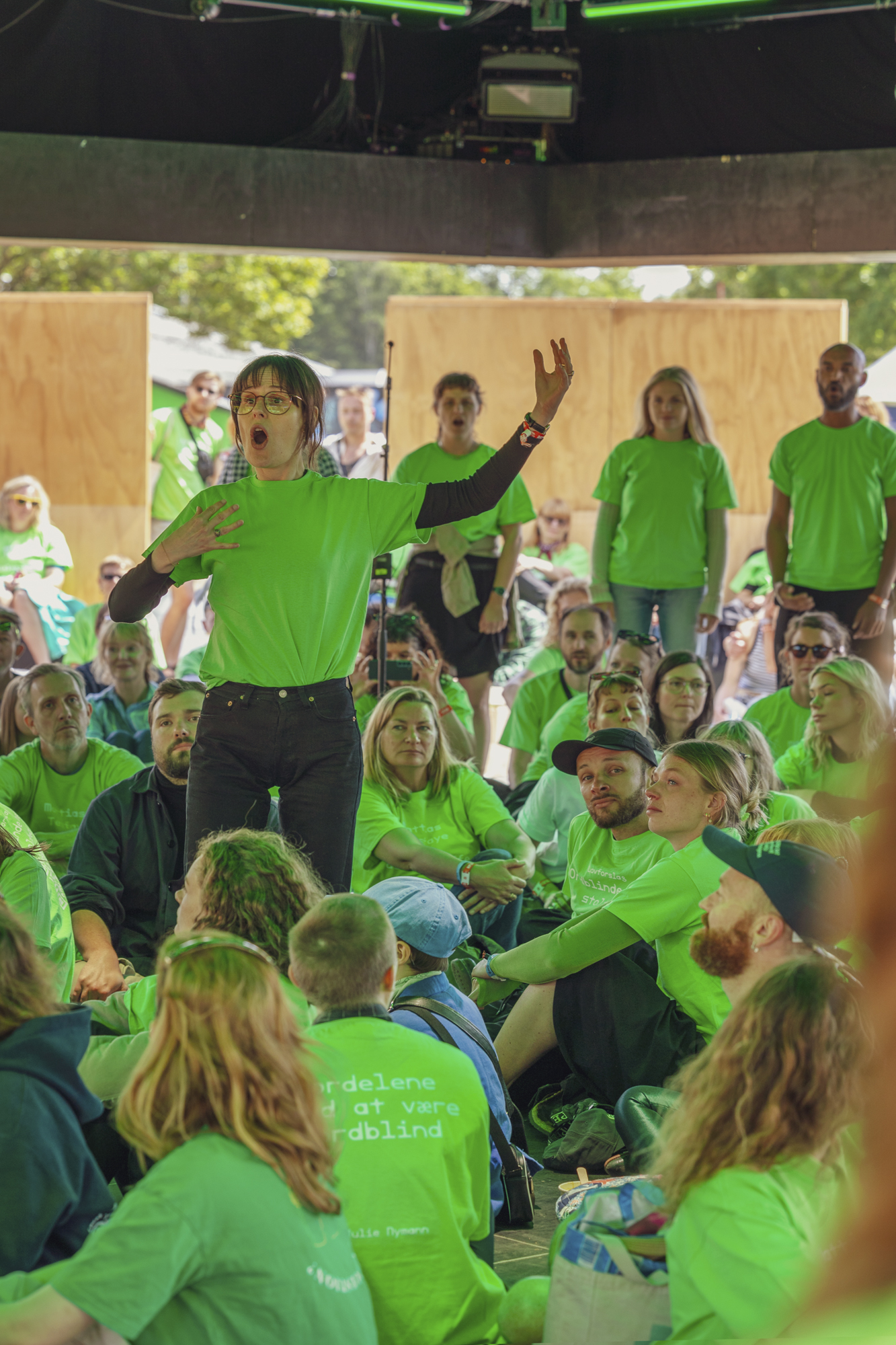
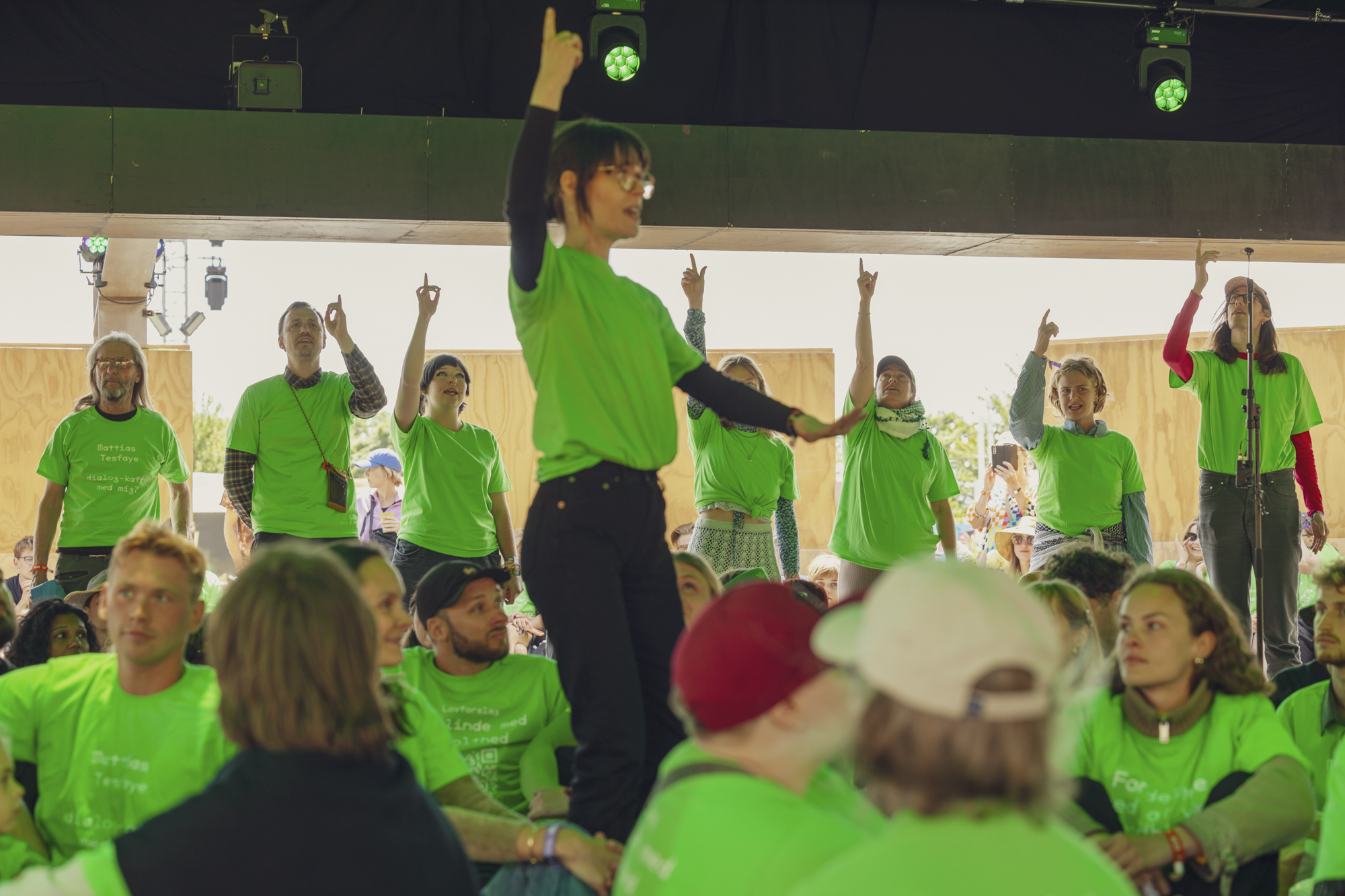
“our voices are dreams
of the future
our pride grows into the green colour
dreams of future a united union.”
Lyrics from the song A united union by Julie Nymann in collaboration with Agnes Valbjørn Stavnsberg.

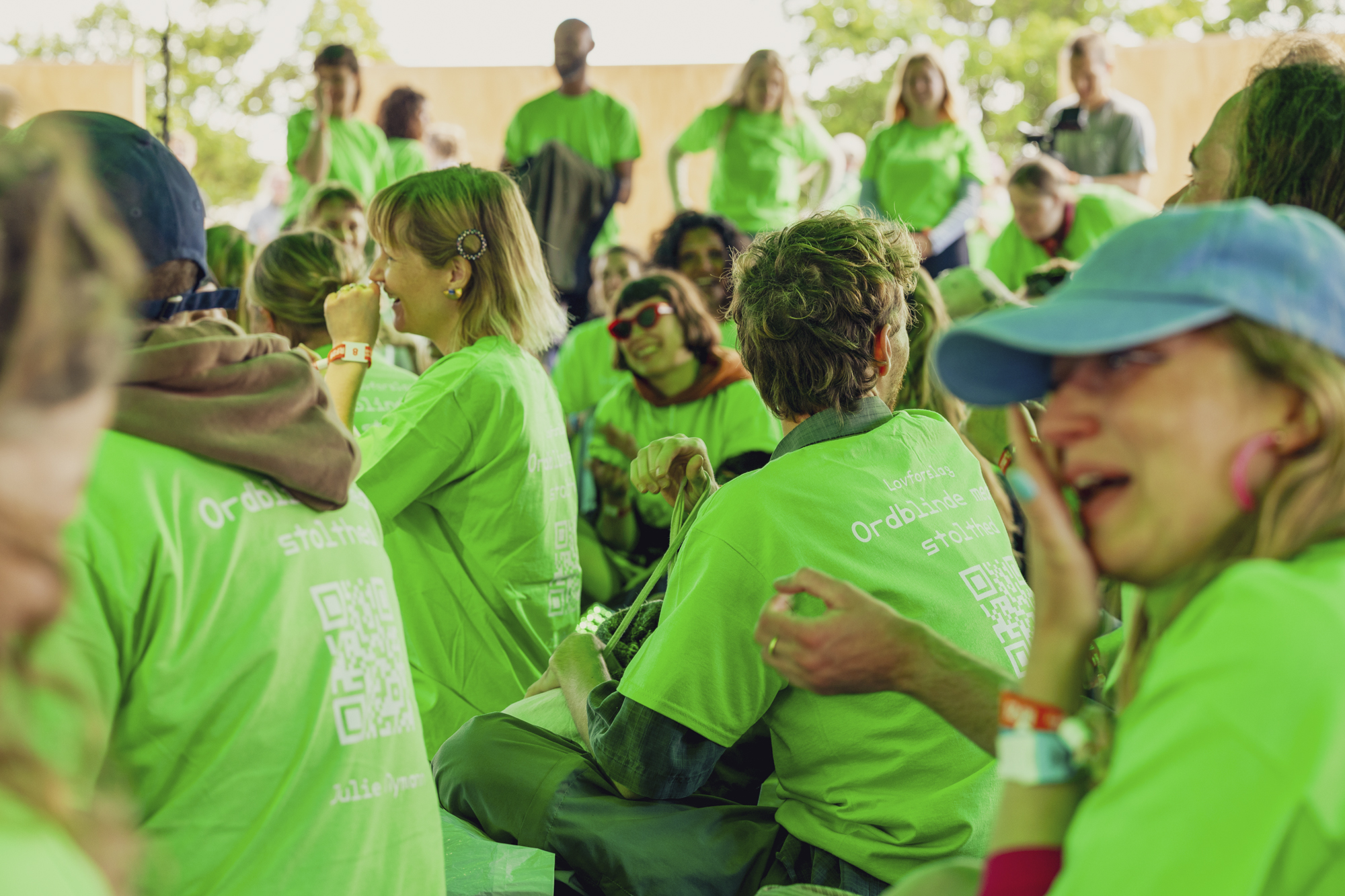
Installation view at Platform stage Roskilde Festival 2025. photos Frida Gregersen
video Andreas Johnsen og Mik Stampe Fogh
CREDITS
PLATFORM
Korperformance: Fordelene ved at være ordblind
Choir performance: Advantages of being dyslexic
artist
Julie Nymann
choir director & composer
Mette Damm
sound design
Stephen William McEvoy
vokal VUC Roskilde
HF for Ordblinde Students
vokal performere
Proceskoret
lead vokal performere
Henrik Chulu, Åse Eg Jørgensen, Jesper Thorn, Olivia Barrett, Mette Moltke Wozniak
clothing
Jørnæs
graphic elements
Louis Montes
typeface
ABC Dinamo
original score
Fordelene ved at være ordblind
artist & writer
Julie Nymann
sound designer
Joëlle McGovern Serret
script editor
Agnes Valbjørn Stavnsbjerg
composer, producer A unified union
Agnes Valbjørn Stavnsbjerg
narrator
Jonas Kjeldgaard Sørensen, Mette Moltke Wozniak, Julie Nymann
voices
Limfjordskolen Struer, Ordblindeklubben Nørre Nissum, FGU Vesterbro, Anette Marcher, Kim Lykkegaard, Marie Vedsmand
Korperformance: Fordelene ved at være ordblind
Choir performance: Advantages of being dyslexic
artist
Julie Nymann
choir director & composer
Mette Damm
sound design
Stephen William McEvoy
vokal VUC Roskilde
HF for Ordblinde Students
vokal performere
Proceskoret
lead vokal performere
Henrik Chulu, Åse Eg Jørgensen, Jesper Thorn, Olivia Barrett, Mette Moltke Wozniak
clothing
Jørnæs
graphic elements
Louis Montes
typeface
ABC Dinamo
original score
Fordelene ved at være ordblind
artist & writer
Julie Nymann
sound designer
Joëlle McGovern Serret
script editor
Agnes Valbjørn Stavnsbjerg
composer, producer A unified union
Agnes Valbjørn Stavnsbjerg
narrator
Jonas Kjeldgaard Sørensen, Mette Moltke Wozniak, Julie Nymann
voices
Limfjordskolen Struer, Ordblindeklubben Nørre Nissum, FGU Vesterbro, Anette Marcher, Kim Lykkegaard, Marie Vedsmand
communications
strategic
Rytter & Denke
studio
Karina Lykkesborg, Pauline Koffi Vandet, Katinka Saarnak, Malou Solfjeld
institutional collaborations
Roskilde Festival & Art Hub Copenhagen
head of art & activism
Sarah Staalhøj
head of art production
Martin Ilsøe
curator
Andrea Mæland
choir communication
Sarah Pihl Petersen, Thea Møller Jensen
Special thanks
The Behind-the-Scenes Team
Supported by
Roskilde Festival, Art Hub Copenhagen, Statens Kunstfond, Statens Værksteder for Kunst, Dansk Tennis Fond, Honoré Fonden, Den Hielmstierne-Rosencroneske Stiftelse, BUPL’s solidaritets- og kulturfond, Messetæpper og Flügger
strategic
Rytter & Denke
studio
Karina Lykkesborg, Pauline Koffi Vandet, Katinka Saarnak, Malou Solfjeld
institutional collaborations
Roskilde Festival & Art Hub Copenhagen
head of art & activism
Sarah Staalhøj
head of art production
Martin Ilsøe
curator
Andrea Mæland
choir communication
Sarah Pihl Petersen, Thea Møller Jensen
Special thanks
The Behind-the-Scenes Team
Supported by
Roskilde Festival, Art Hub Copenhagen, Statens Kunstfond, Statens Værksteder for Kunst, Dansk Tennis Fond, Honoré Fonden, Den Hielmstierne-Rosencroneske Stiftelse, BUPL’s solidaritets- og kulturfond, Messetæpper og Flügger
acquired by
Kunst på Arbejde
Kunst på Arbejde
Dyslektiske styrker er frø vi vil så
Dyslexic strengths are seeds we will plant
2025 | 8 wall-mounted prints on green panels
exhibited | Gloria’s foyer Roskilde Festival 2025; GRASP 2025
Nymann’s extensive research on dyslexia led to interviews with more than 80 people living with dyslexia, focusing on the advantages they had discovered in their own experiences. This emphasis on strengths is expressed in the hanging wall pieces Dyslexic strengths are seeds we will plant, which combine the artist’s own poetic reflections with insights from the interviewees.

der er mange måder at bære ordblindhed på
(there are many ways to carry dyslexia)
dyslektiske styrer er frø, vi vil så
(dyslexic strengths are seeds we will plant)
farver har betydning følg den grønne vej
(colours matter, follow the green path)
vi prøver igen, igen, giver ikke op
(we try again and again, we never give up)
(there are many ways to carry dyslexia)
dyslektiske styrer er frø, vi vil så
(dyslexic strengths are seeds we will plant)
farver har betydning følg den grønne vej
(colours matter, follow the green path)
vi prøver igen, igen, giver ikke op
(we try again and again, we never give up)
vi er ikke bange for at be’ om hjælp
(we are not afraid to ask for help)
vi læser verden med vores sind
(we read the world with our minds)
trænet i alternative løsninger
(trained in alternative solutions)
vi er gode ledere
(we are good leaders)
(we are not afraid to ask for help)
vi læser verden med vores sind
(we read the world with our minds)
trænet i alternative løsninger
(trained in alternative solutions)
vi er gode ledere
(we are good leaders)

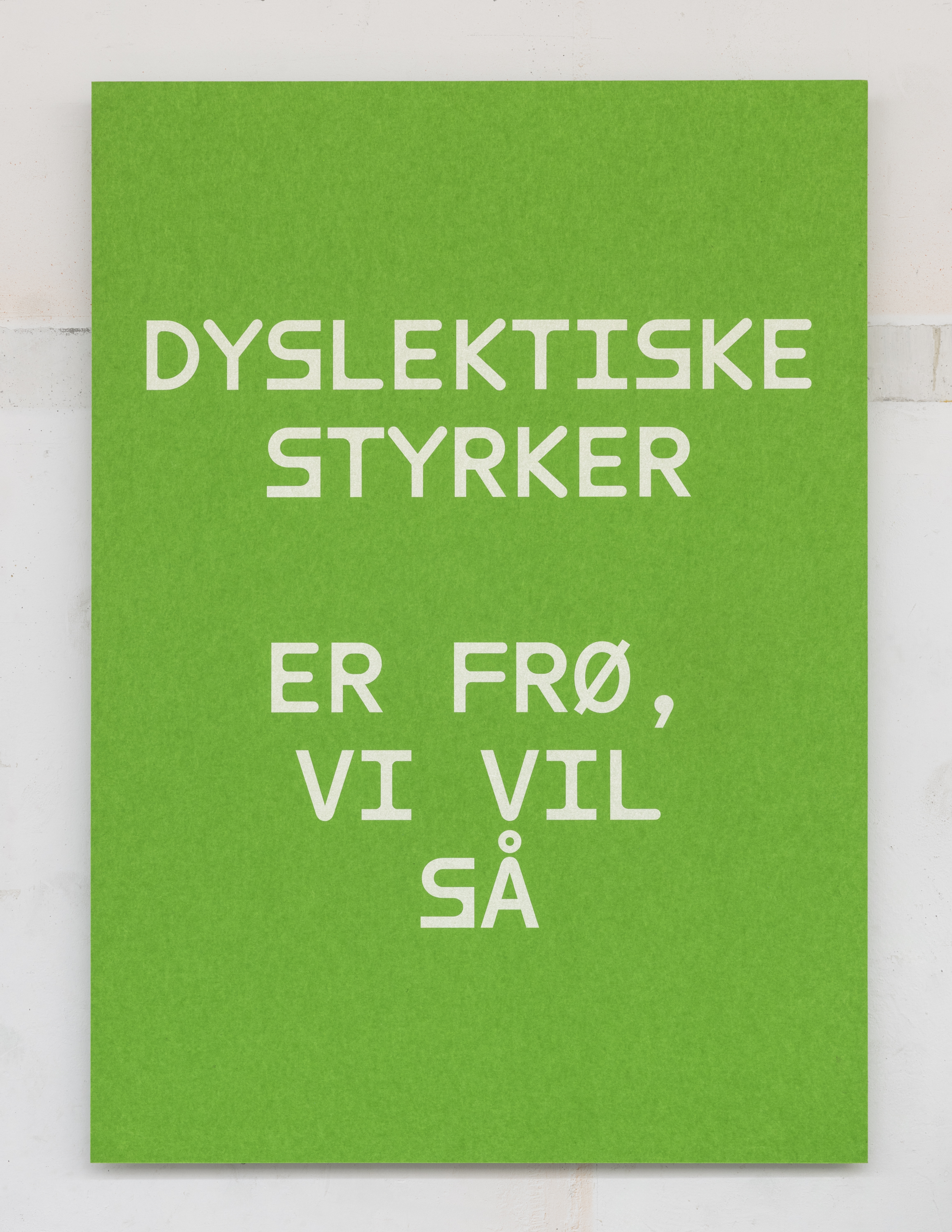
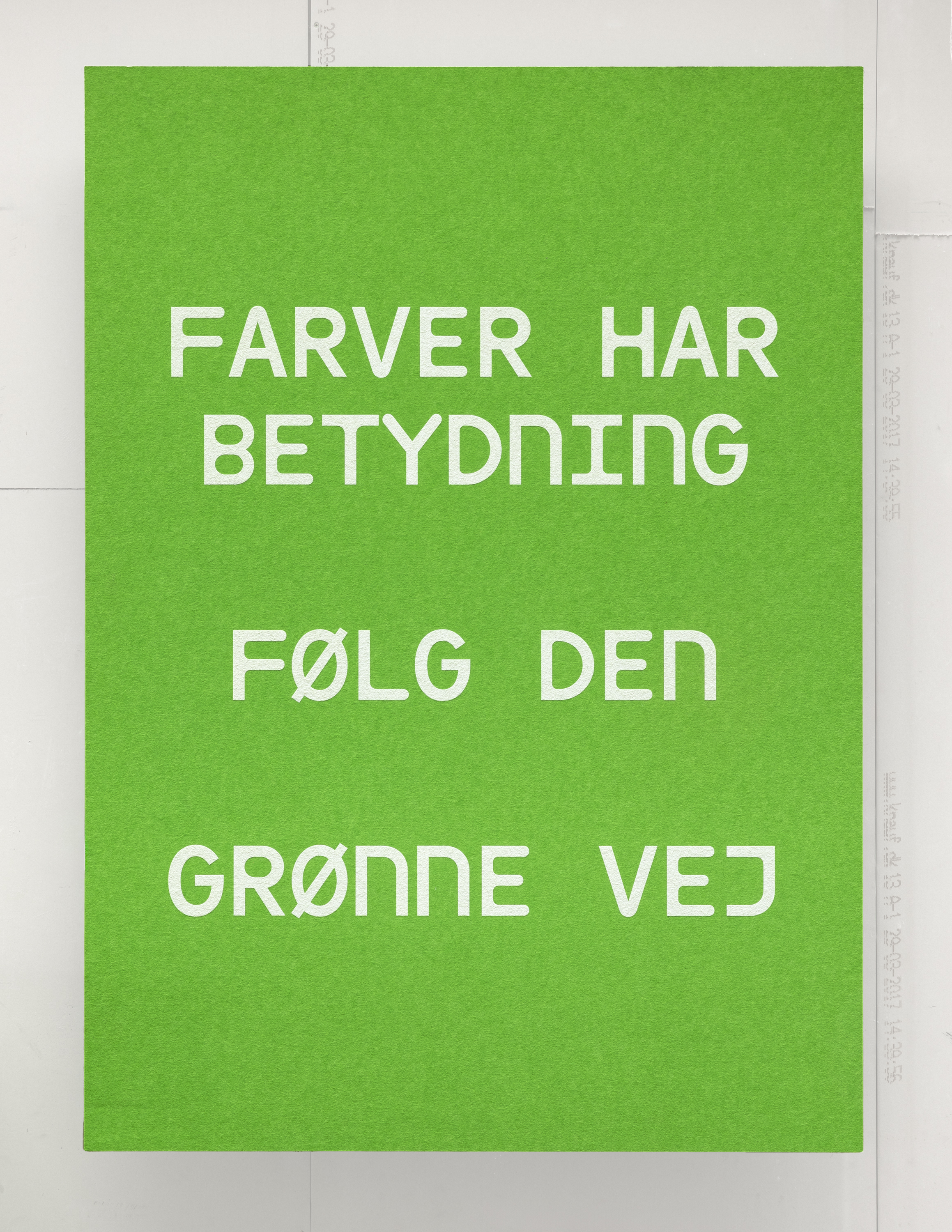

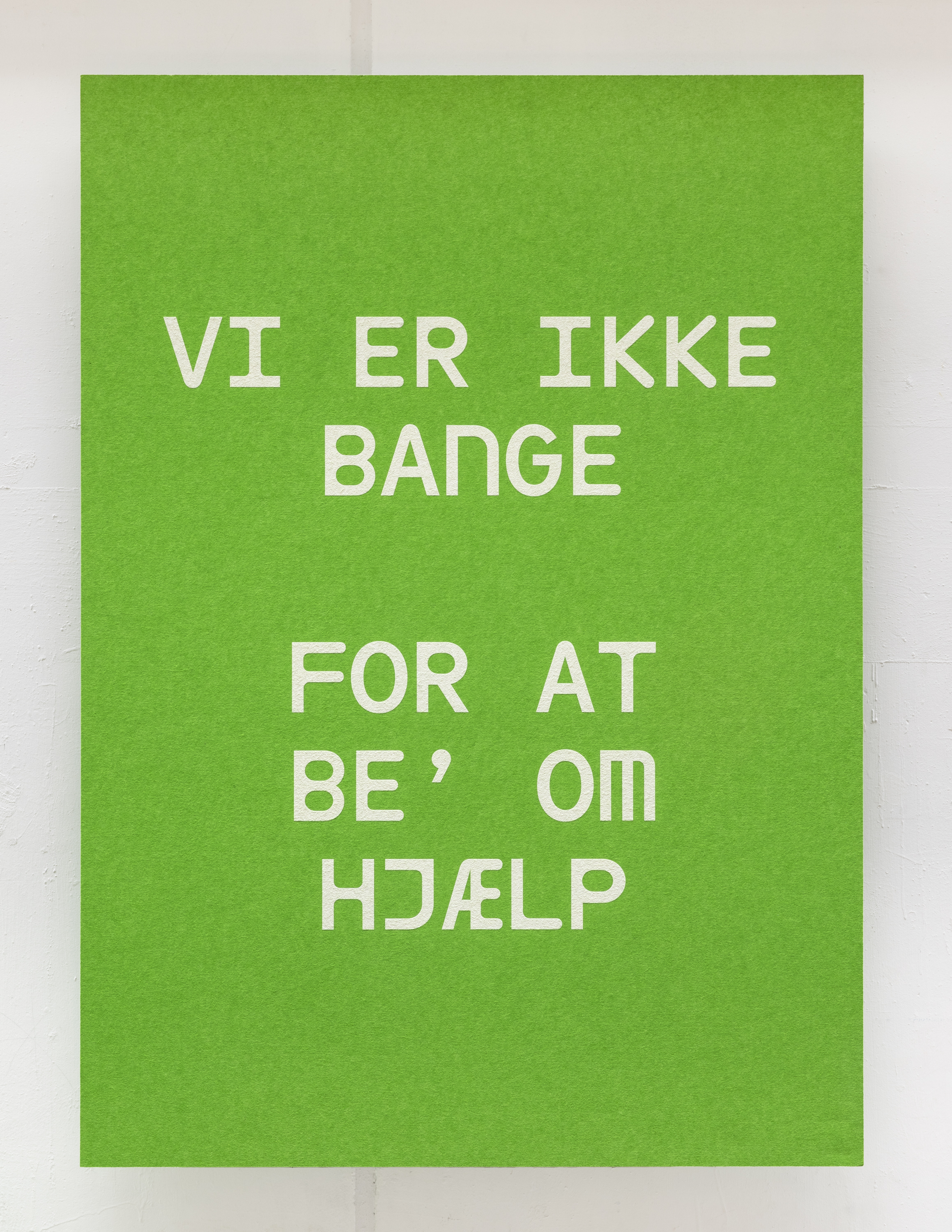
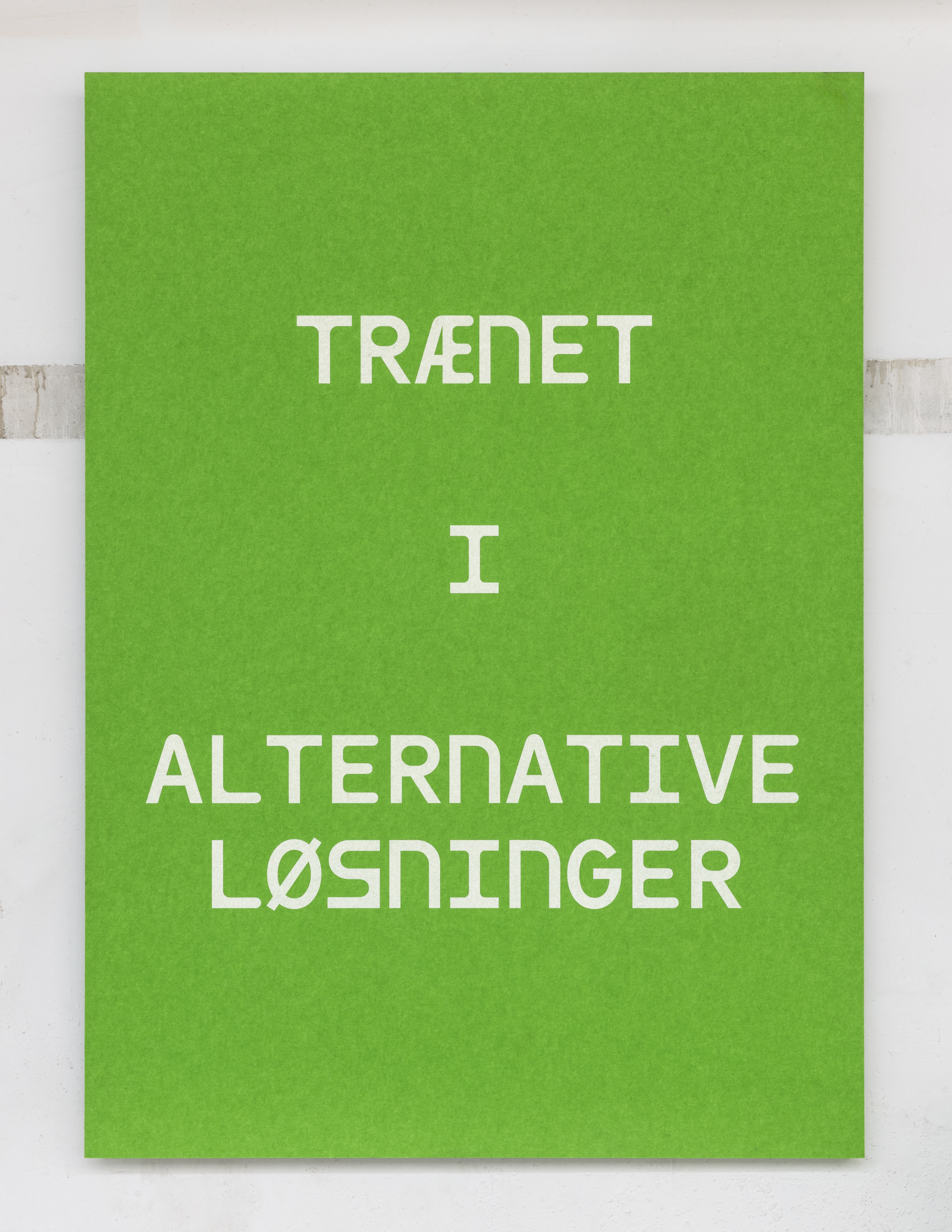
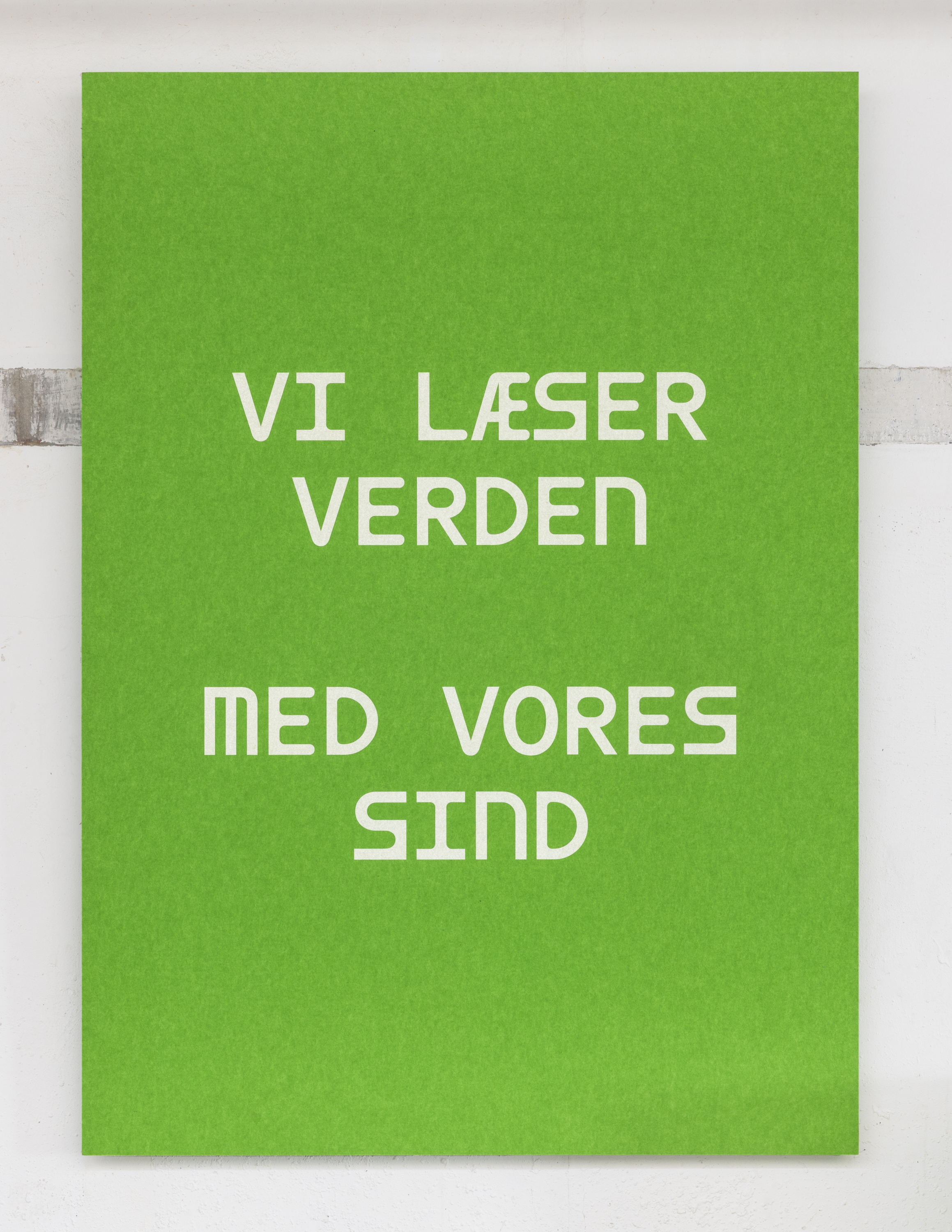


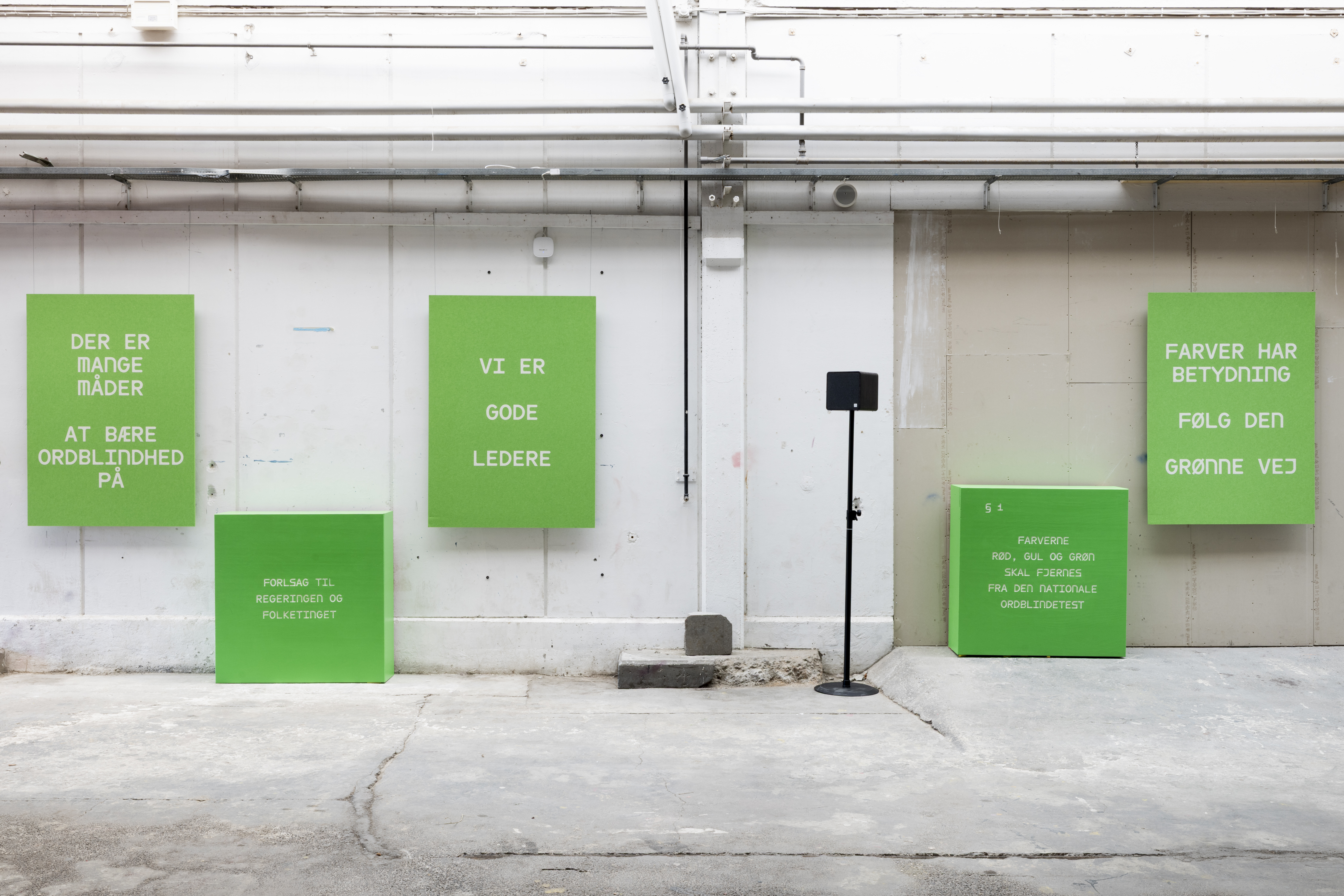
Installation view at GRASP 2025. Photo Mads Holm
ILLUSTRATED
Nationalt Videncenter for Læsning
Viden om Literacy nr. 38
Nationalt Videncenter for Læsning
Viden om Literacy nr. 38

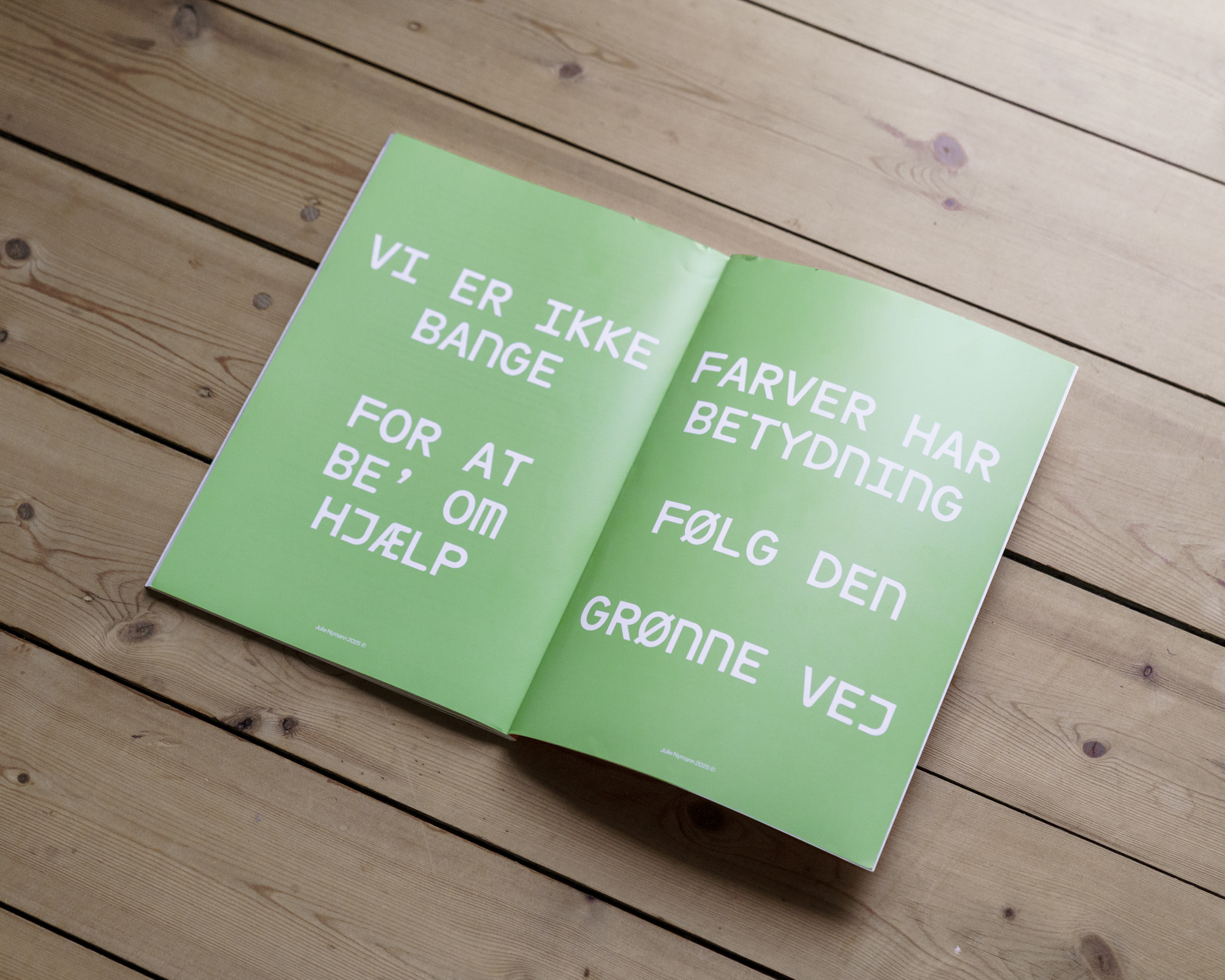
CREDITS
artist
Julie Nymann
Grafisk Design
Louis Montes
Julie Nymann
Grafisk Design
Louis Montes
Institutional Collaborations
Roskilde Festival & Art Hub Copenhagen
Roskilde Festival & Art Hub Copenhagen
Fordelen ved at være ordblind
Advantages of being dyslexic2024 | 8-channel sound installation | 5x5 m green fabric room | 21:00 min
exhibited | Kunsthal Charlottenborg; Struer Museum; Dokk1
Advantages of Being Dyslexic is a 21-minute immersive, monumental sound installation. Eight speakers fill a green fabric room, inviting visitors to listen to powerful, personal stories about dyslexia. These voices, collected from more than 80 people aged 10–70 through workshops and an open call led by the artist in 2023, offer intimate glimpses into the many ways dyslexia shapes life and thinking.

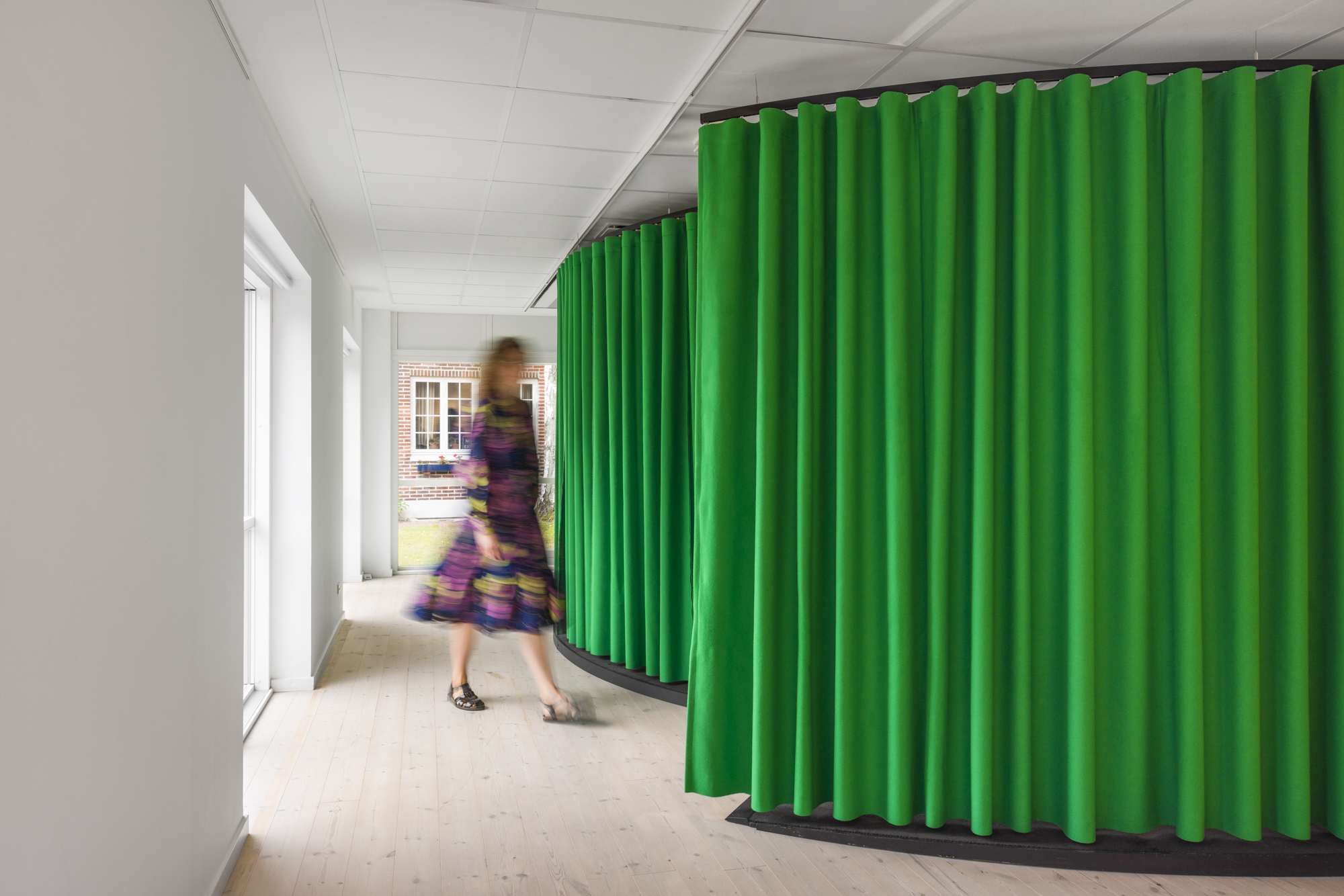
More than 500,000 people live with dyslexia in Denmark, and for most of the workshop participants, it was the first time they were asked about the advantages of dyslexia.
The work highlights how their ways of coping with dyslexia can be seen as a superpower. It challenges society’s perception of dyslexia and offers a layered understanding of lived experiences and neurodiversity.
The work highlights how their ways of coping with dyslexia can be seen as a superpower. It challenges society’s perception of dyslexia and offers a layered understanding of lived experiences and neurodiversity.
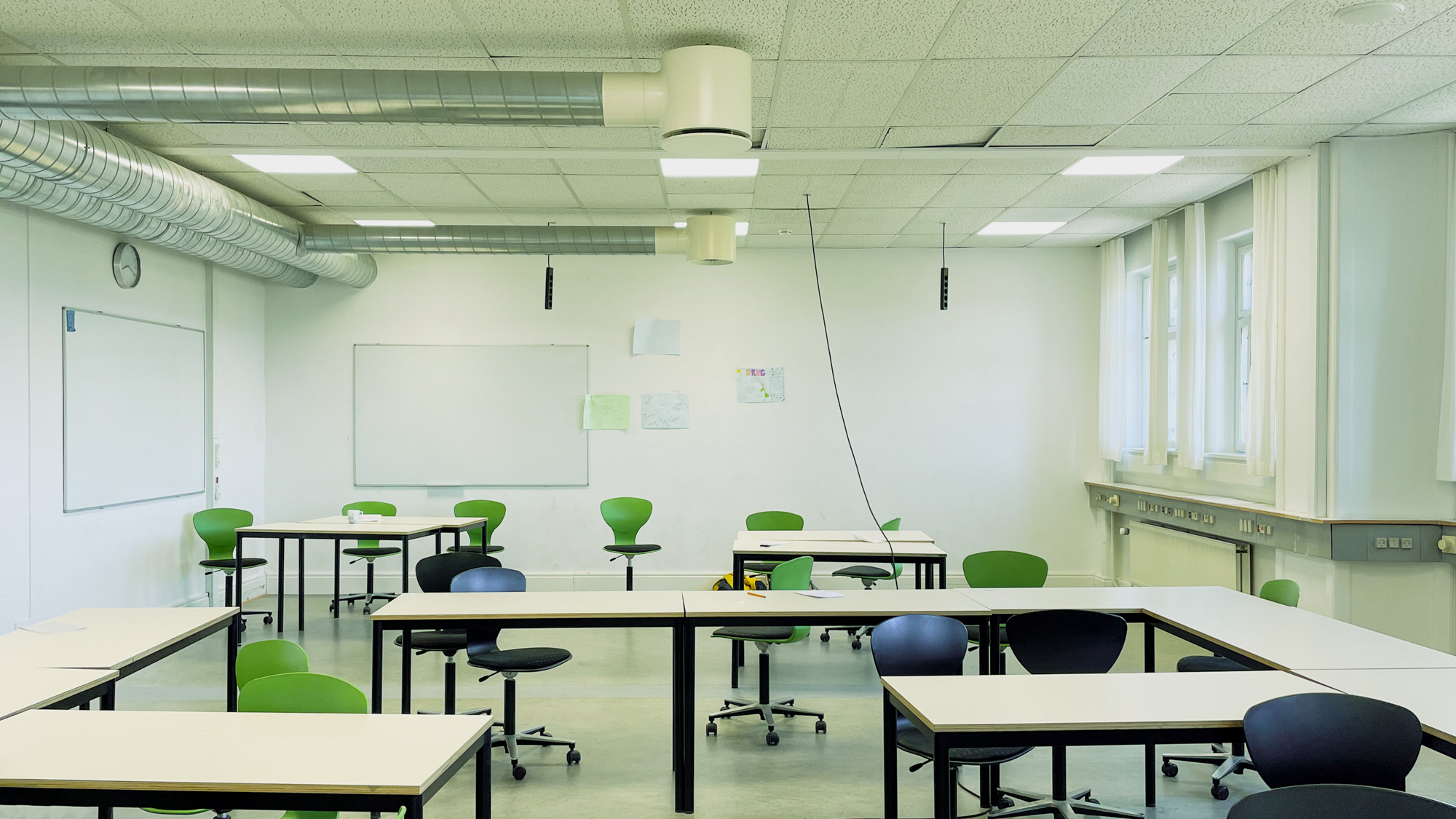
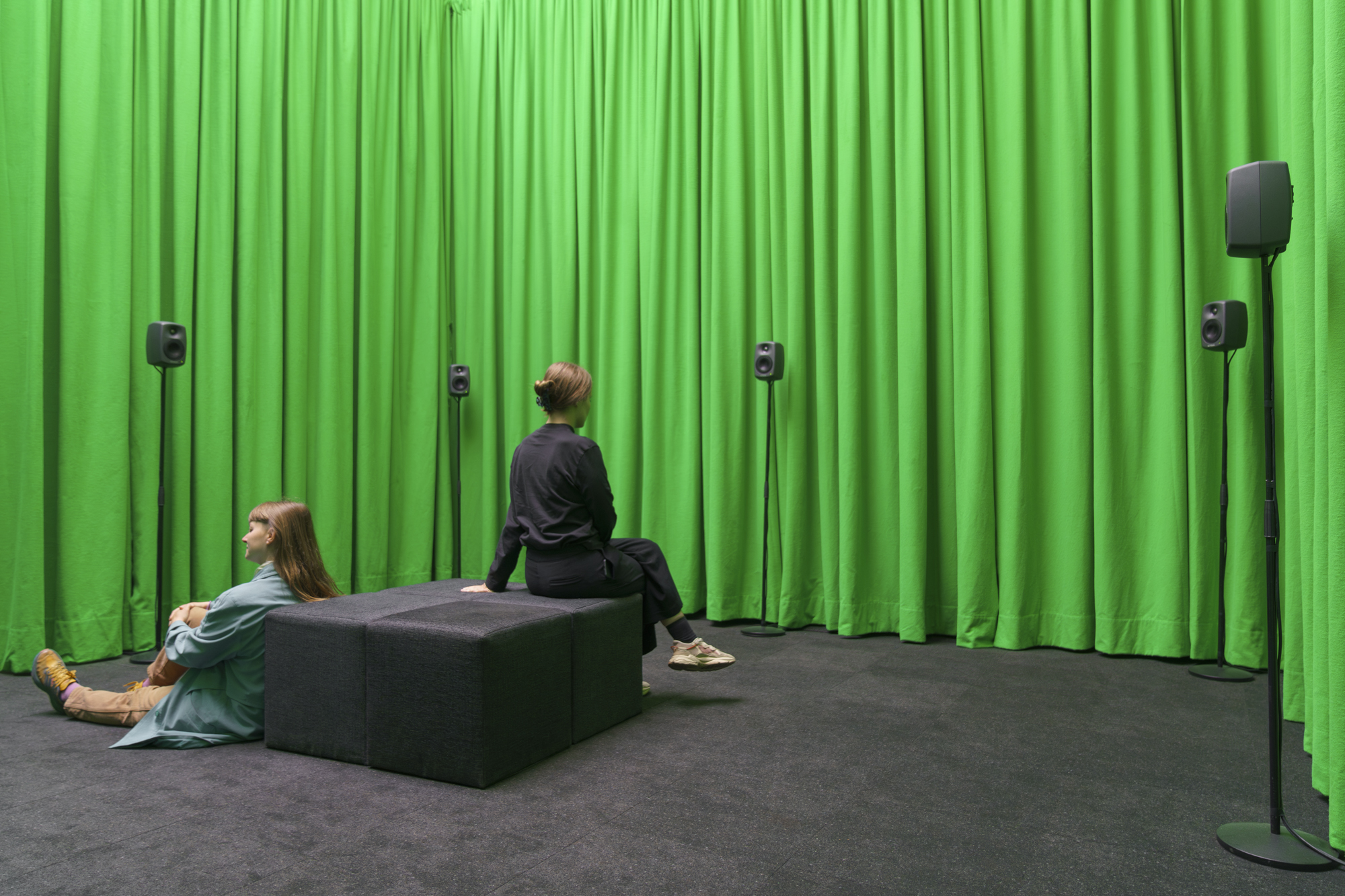
Nymann’s work focuses on the first-person perspective, exploring what it feels like to have dyslexia, and questions societal narratives that frame dyslexia primarily through deficit.
By emphasizing the strengths that dyslexia has given rise to for the participating individuals, Nymann turns the discourse upside down and, through aesthetic means, invites curiosity about dyslexia, its causes, and its consequences.
By emphasizing the strengths that dyslexia has given rise to for the participating individuals, Nymann turns the discourse upside down and, through aesthetic means, invites curiosity about dyslexia, its causes, and its consequences.
Advantages of Being Dyslexic examines dyslexia not only as a learning difficulty but as a personal and embodied experience, using aesthetic strategies to open up new understandings and conversations within educational, communicative, and artistic contexts.
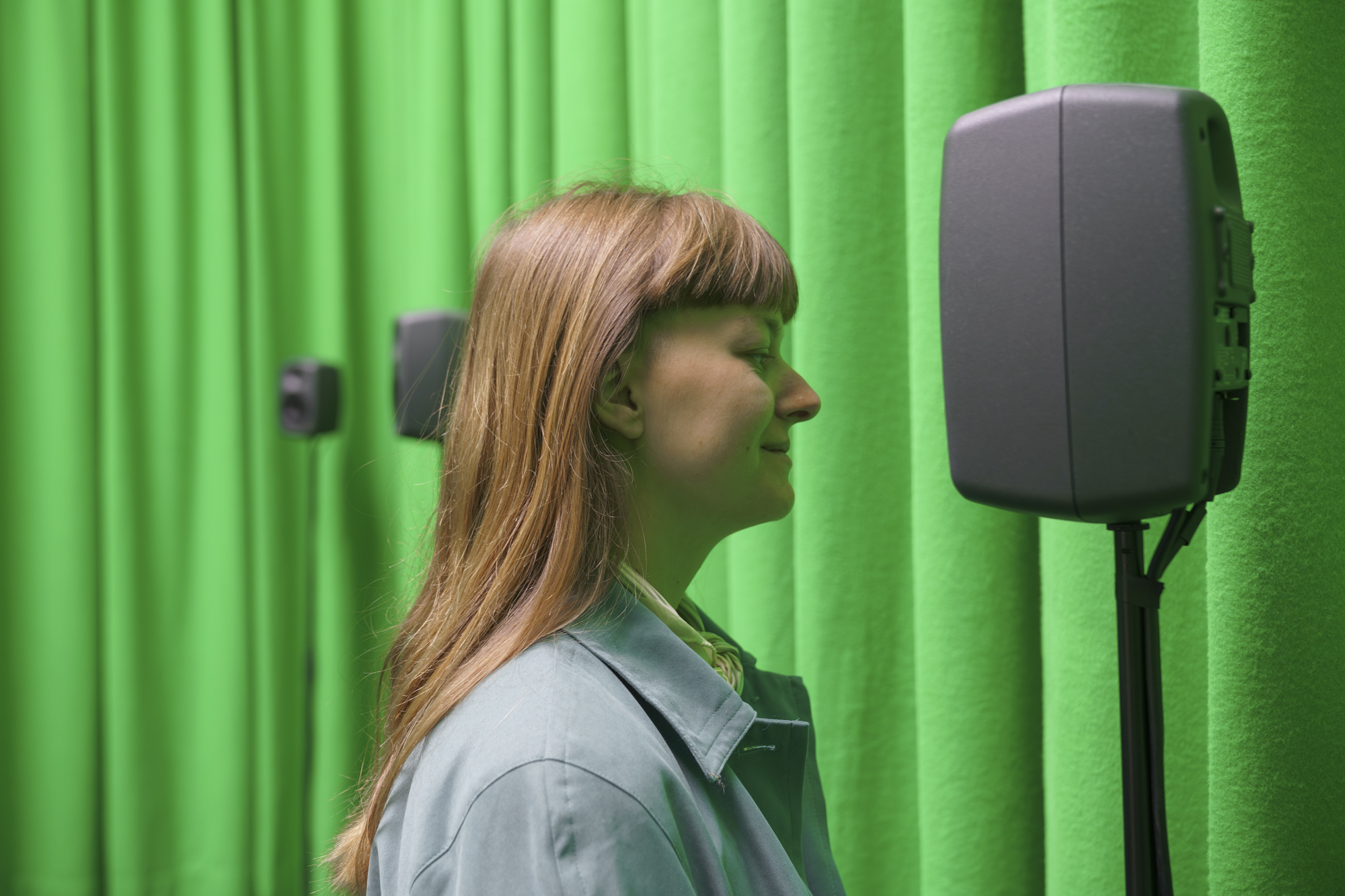

PRESS
"I could relate to almost everything and felt acknowledged and understood."
— Anonymous museum visitor
— Anonymous museum visitor
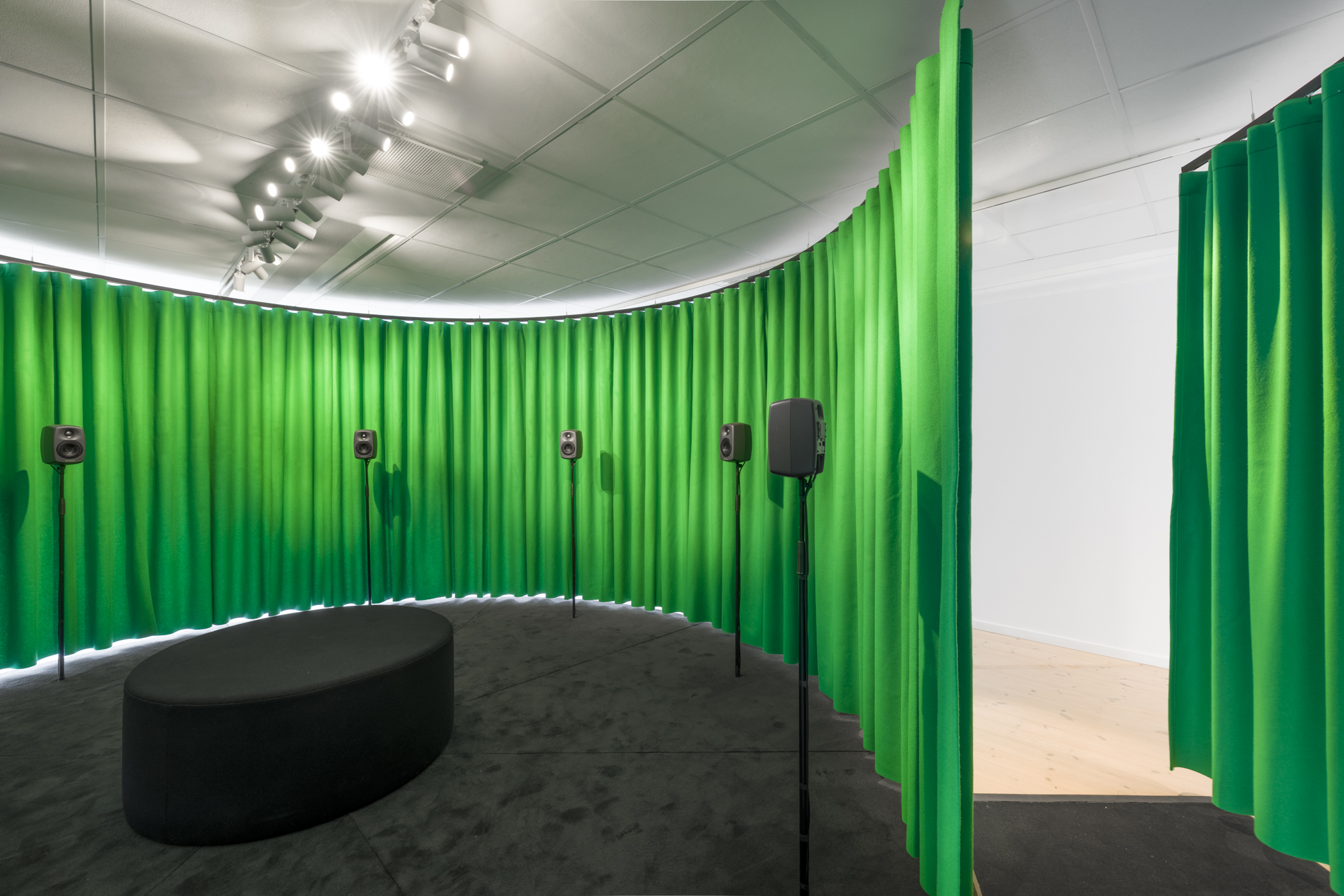
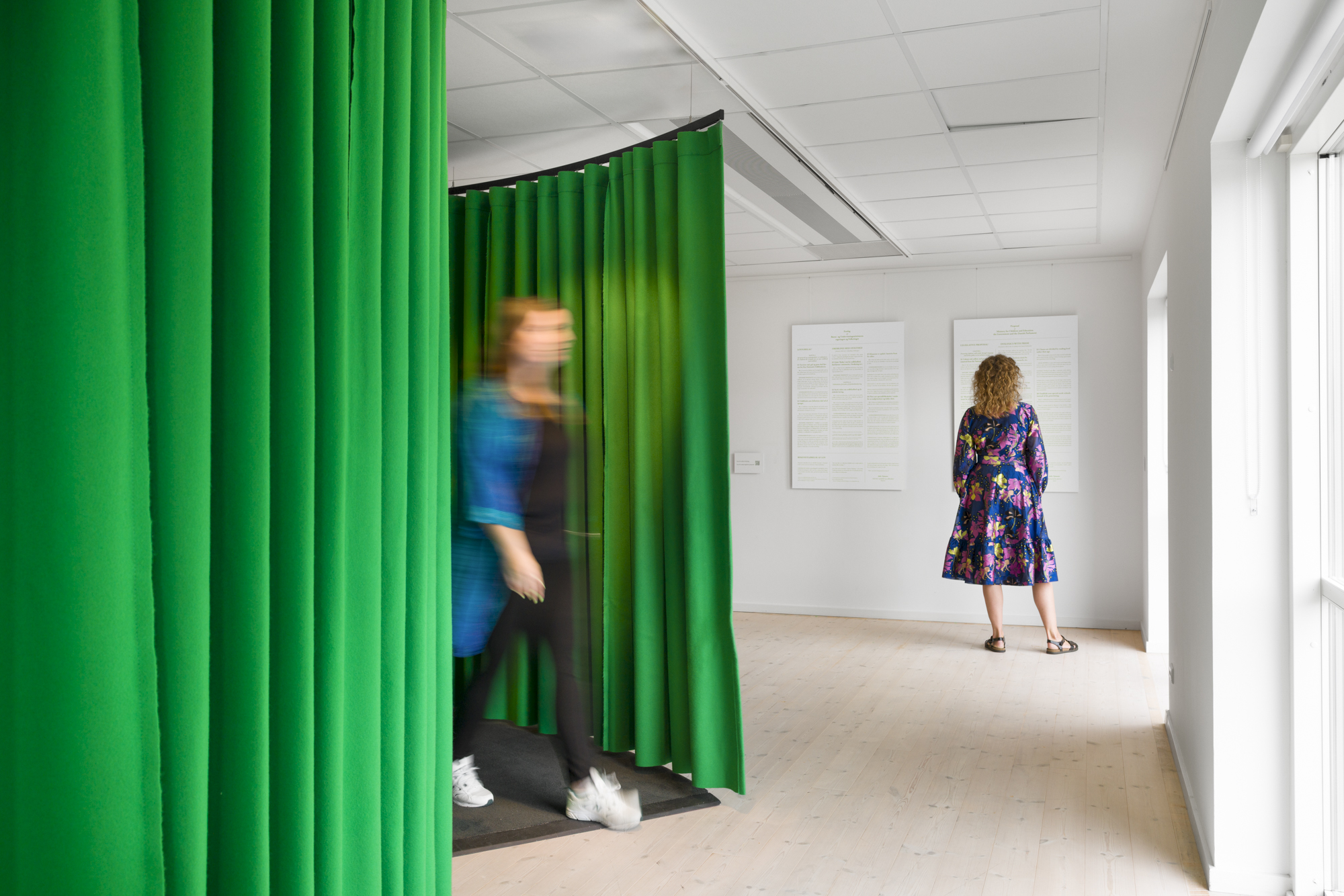
1 min trailer. Installation view at Struer Museum
CREDITS
artist
Julie Nymann
sound designer
Joëlle McGovern Serret
»samlet union«
composer & producer
Agnes Valbjørn Stavnsbjerg
narrator
Jonas Kjeldgaard Sørensen
Mette Moltke Wozniak
Julie Nymann
voices
Limfjordskolen Struer, Ordblindeklubben Nørre Nissum, FGU Vesterbro, Anette Marcher, Kim Lykkegaard and Marie Vedsmand
writer
Julie Nymann
script editor
Agnes Valbjørn Stavnsbjerg
dramaturgi
Julie Nymann
Joëlle McGovern Serret
technical coordination
Kristine Bech Sørensen
technical assistance
Nikolaj N. Phillipsen
Keith Allan
Tilda Lundbohm
Julie Nymann
sound designer
Joëlle McGovern Serret
»samlet union«
composer & producer
Agnes Valbjørn Stavnsbjerg
narrator
Jonas Kjeldgaard Sørensen
Mette Moltke Wozniak
Julie Nymann
voices
Limfjordskolen Struer, Ordblindeklubben Nørre Nissum, FGU Vesterbro, Anette Marcher, Kim Lykkegaard and Marie Vedsmand
writer
Julie Nymann
script editor
Agnes Valbjørn Stavnsbjerg
dramaturgi
Julie Nymann
Joëlle McGovern Serret
technical coordination
Kristine Bech Sørensen
technical assistance
Nikolaj N. Phillipsen
Keith Allan
Tilda Lundbohm
Struer Museum exhibition is supported by
Færch Fonden, the Danish Arts Foundation, EgeFonden, Knud Højgaards Fond, the Hielmstierne-Rosencrone Foundation, and Kvadrat.
Exit 24 at Kunsthal Charlottenborg is supported by
Politiken-Fonden and Overretssagfører L. Zeuthens Mindelegat
special thanks to all of you for sharing your stories
All teachers and dyslexics who were part of ‘Fordelene ved at være ordblind’-workshops at Københavns VUC, FGU Vesterbro, Limfjordskolen Struer, Ordblindeklubben at Nørre Nissum skole, dyslexics students in higher education who receive SPS, and dyslexics in a public open call
thank you
Sound Art Lab, Ordblindeinstituttet, SPS counselor at Københavns VUC, Struer municipality and library
furthermore, thank you
Andrea Diermayr, Helle Harnisch, Ida Vestergaard Øyan, Jane Hye Jin Kaisen, Kristel Laurits, Kristine Bech Sørensen, Lars Bo Henriksen, Lars Buchholtz, Louise Rytter, Maibritt Borgen, Oskar Koliander, Pi Bartholdy, Rune Søchting, Silas Emmery, Troels Dankert, and Vibeke Rasmussen
Færch Fonden, the Danish Arts Foundation, EgeFonden, Knud Højgaards Fond, the Hielmstierne-Rosencrone Foundation, and Kvadrat.
Exit 24 at Kunsthal Charlottenborg is supported by
Politiken-Fonden and Overretssagfører L. Zeuthens Mindelegat
special thanks to all of you for sharing your stories
All teachers and dyslexics who were part of ‘Fordelene ved at være ordblind’-workshops at Københavns VUC, FGU Vesterbro, Limfjordskolen Struer, Ordblindeklubben at Nørre Nissum skole, dyslexics students in higher education who receive SPS, and dyslexics in a public open call
thank you
Sound Art Lab, Ordblindeinstituttet, SPS counselor at Københavns VUC, Struer municipality and library
furthermore, thank you
Andrea Diermayr, Helle Harnisch, Ida Vestergaard Øyan, Jane Hye Jin Kaisen, Kristel Laurits, Kristine Bech Sørensen, Lars Bo Henriksen, Lars Buchholtz, Louise Rytter, Maibritt Borgen, Oskar Koliander, Pi Bartholdy, Rune Søchting, Silas Emmery, Troels Dankert, and Vibeke Rasmussen
Forslag til lovændring
Ordblinde med stolthed
Legislative proposal: Dyslexia with pride
2024 | mixed media | print; website; t-shirts; seating elements
exhibited | Kunsthal Charlottenborg; Struer Museum; Roskilde Festival
Link to online artistic manifesto ︎︎︎︎
Dyslexia with Pride is an artistic manifesto in the form of a Danish legislative proposal. It imagines new laws that reframe dyslexia in education, celebrating it as a strength and empowering those who live with it to feel proud and recognized in society.︎︎︎︎

Installation view at Struer Museum
As part of her choir-performance Advantages of Being Dyslexic at Roskilde Festival, Nymann attracted significant attention by handing out green t-shirts saying “Mattias Tesfaye – coffee with me?”, with a QR code linking to the manifesto.
By addressing Tesfaye, the Danish Minister for Children and Education, the action combined humor with seriousness, sparking conversations about dyslexia and neurodiversity in the Danish educational system.
PRESS
“Julie Nymann is proud to live with dyslexia – it has its advantages: She now has six proposals for the Minister of Education”
– Berlingske
By addressing Tesfaye, the Danish Minister for Children and Education, the action combined humor with seriousness, sparking conversations about dyslexia and neurodiversity in the Danish educational system.
PRESS
“Julie Nymann is proud to live with dyslexia – it has its advantages: She now has six proposals for the Minister of Education”
– Berlingske
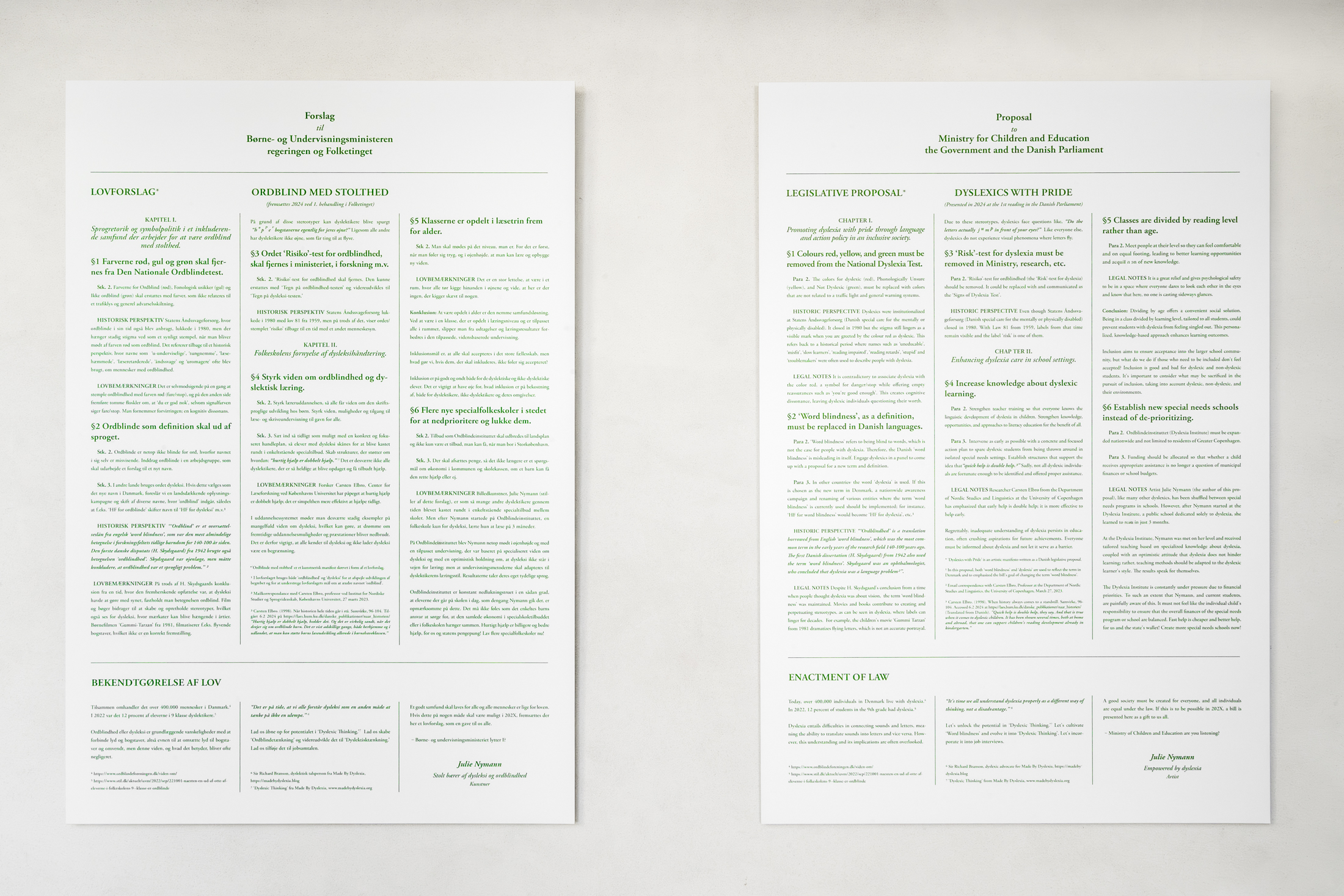
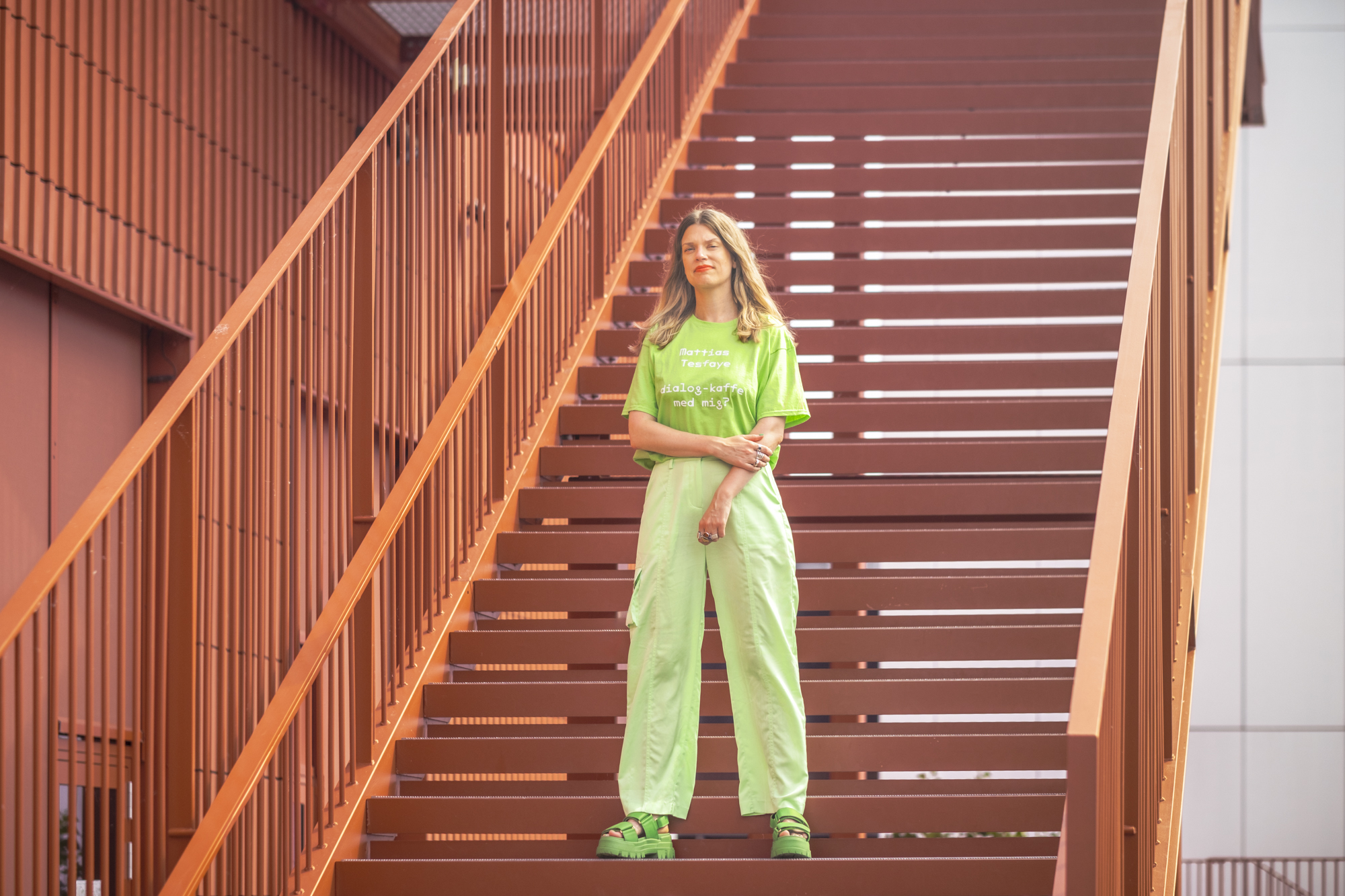


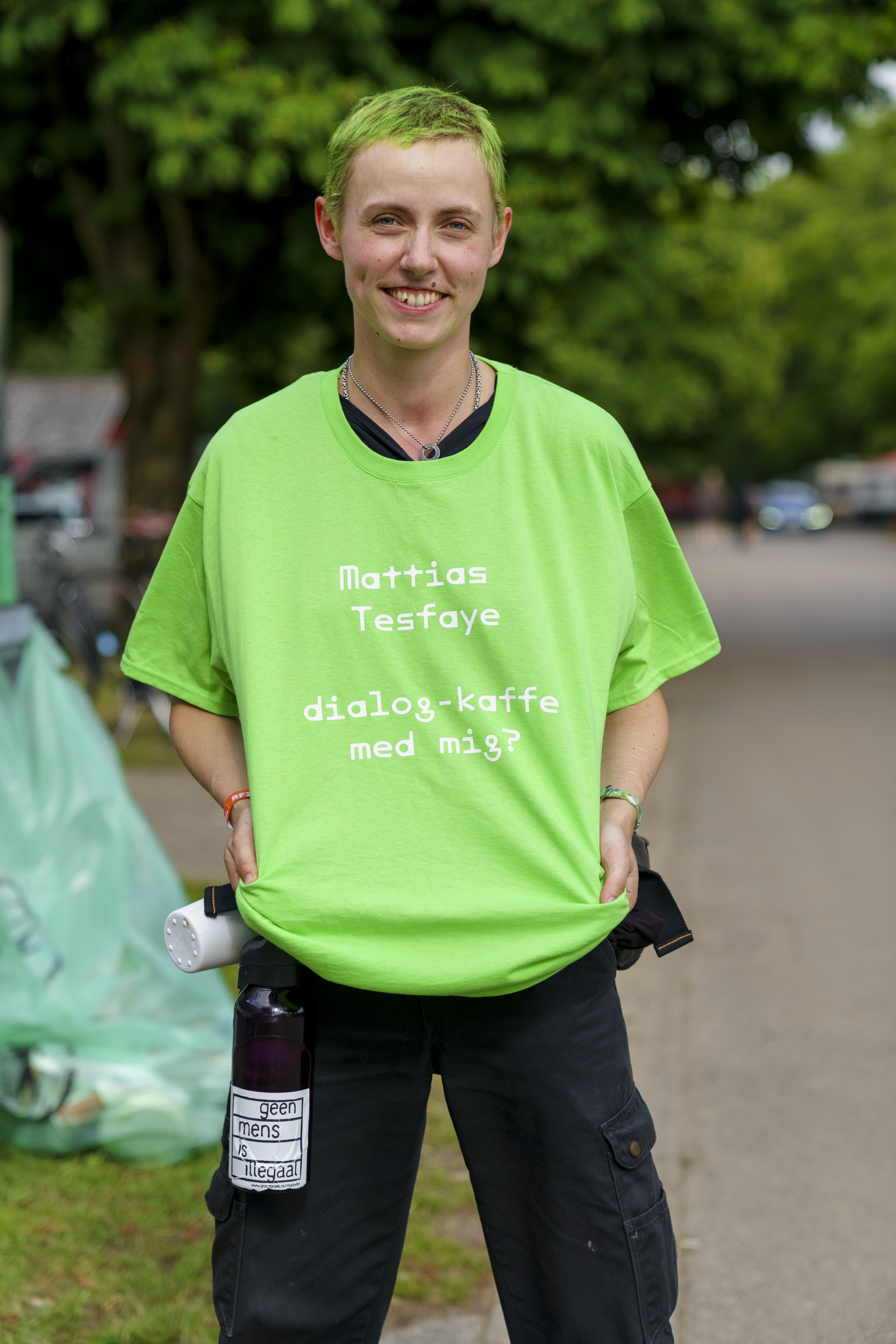
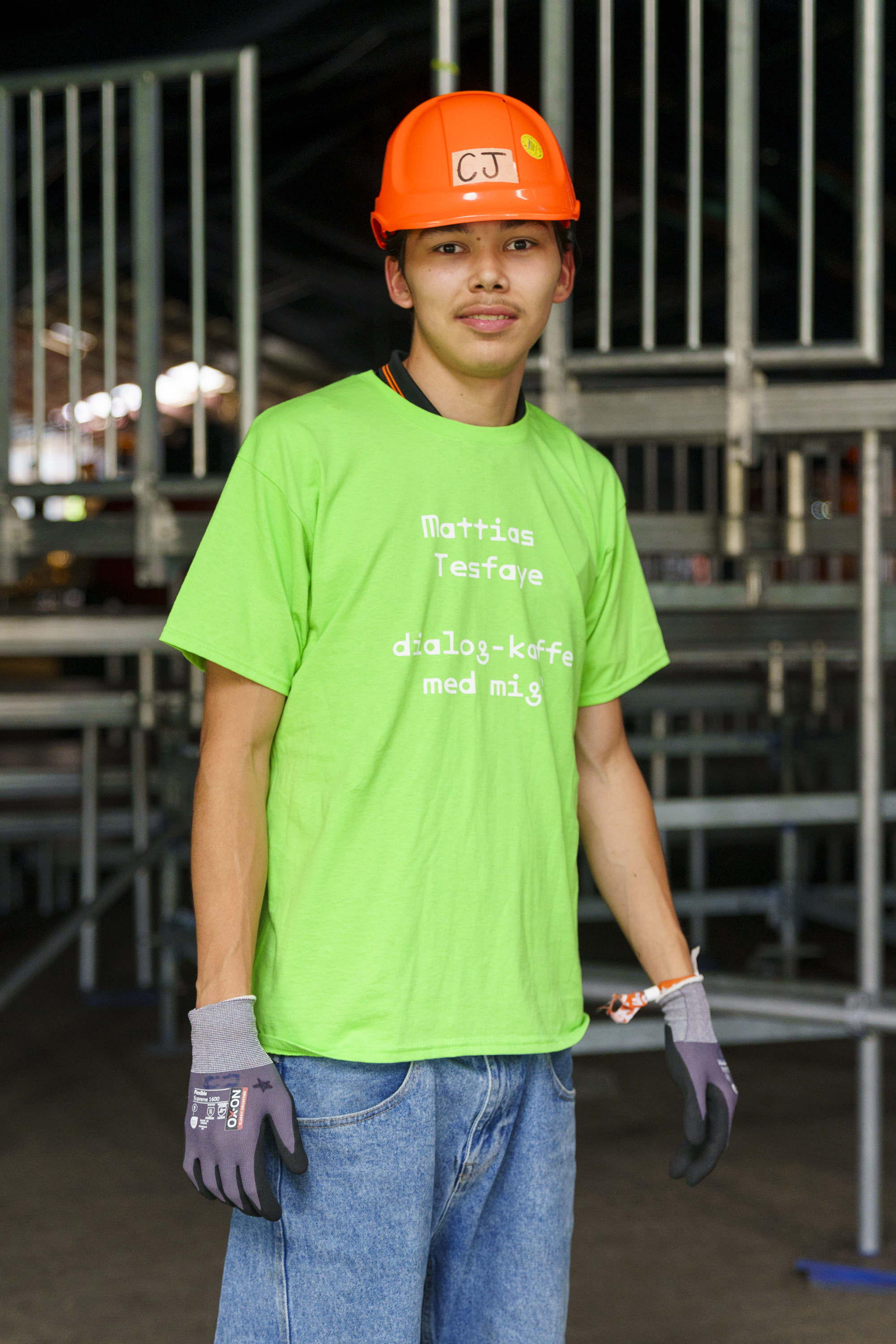
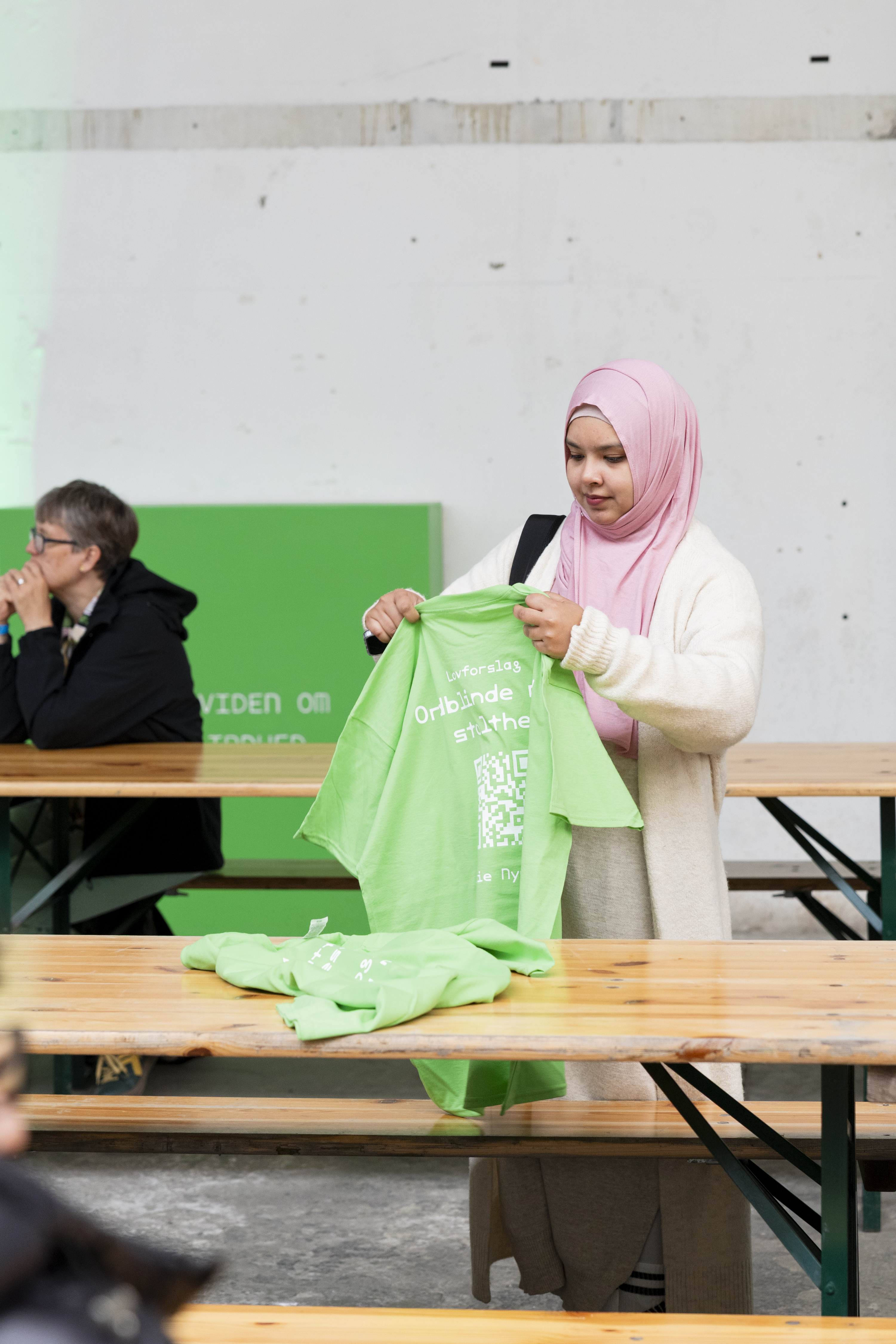
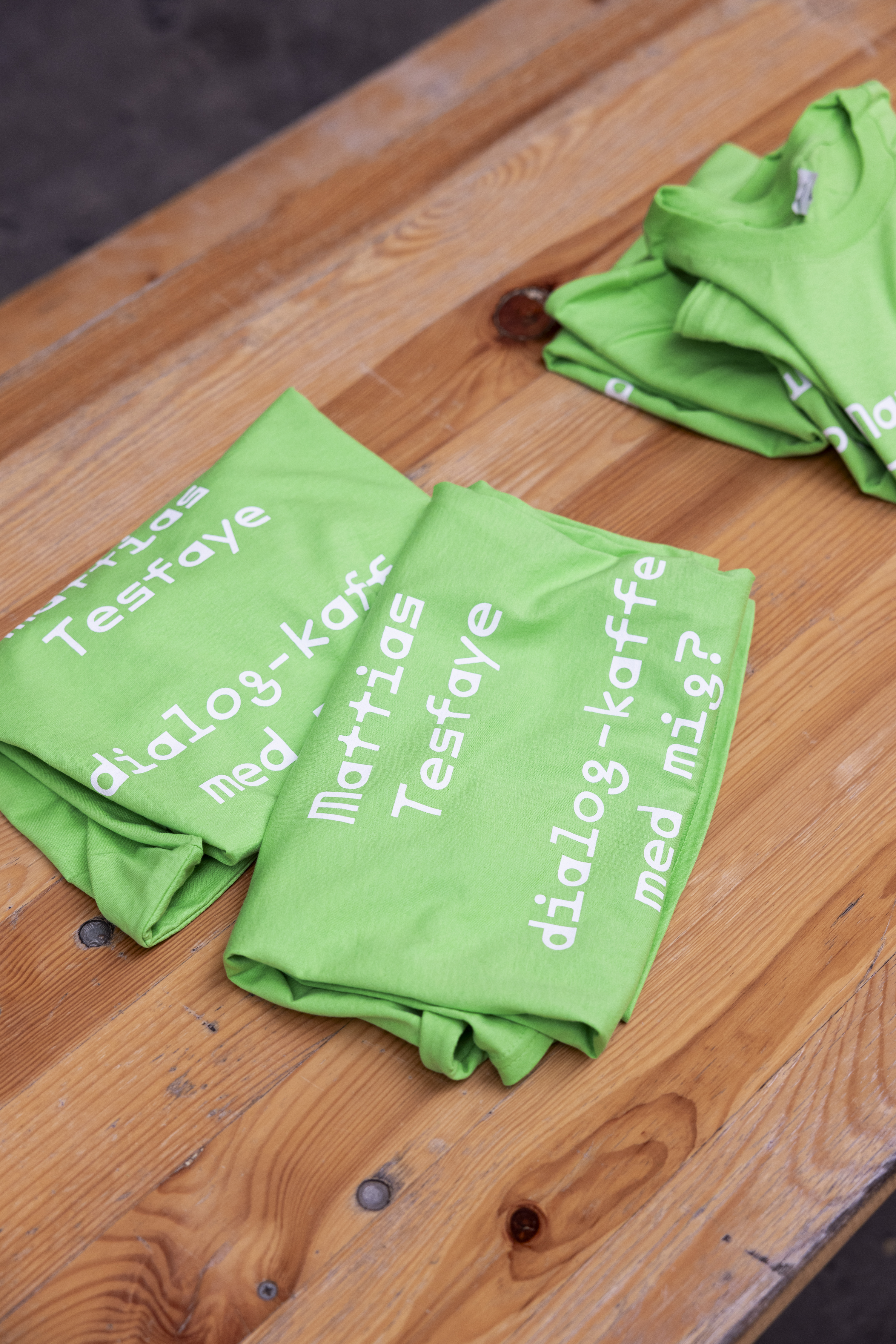

For Our Voices Carry Future Dreams at Roskilde Festival 2025, Nymann created seating elements featuring statements from her legislative proposals, including a call to stop using (ordblind) “word-blindness” for dyslexia.
Nymann’s artistic manifesto and her broader practice focusing on dyslexia and neurodiversity have established her as a prominent voice in discussions on learning and well-being, earning widespread media recognition. Her work has created tangible impact, inspiring positive change and opening new approaches to education. Through these immersive pieces, participants gain sensory and human insights into learning experiences that are often reduced to tests, diagnoses, and support documents.
Nymann’s artistic manifesto and her broader practice focusing on dyslexia and neurodiversity have established her as a prominent voice in discussions on learning and well-being, earning widespread media recognition. Her work has created tangible impact, inspiring positive change and opening new approaches to education. Through these immersive pieces, participants gain sensory and human insights into learning experiences that are often reduced to tests, diagnoses, and support documents.
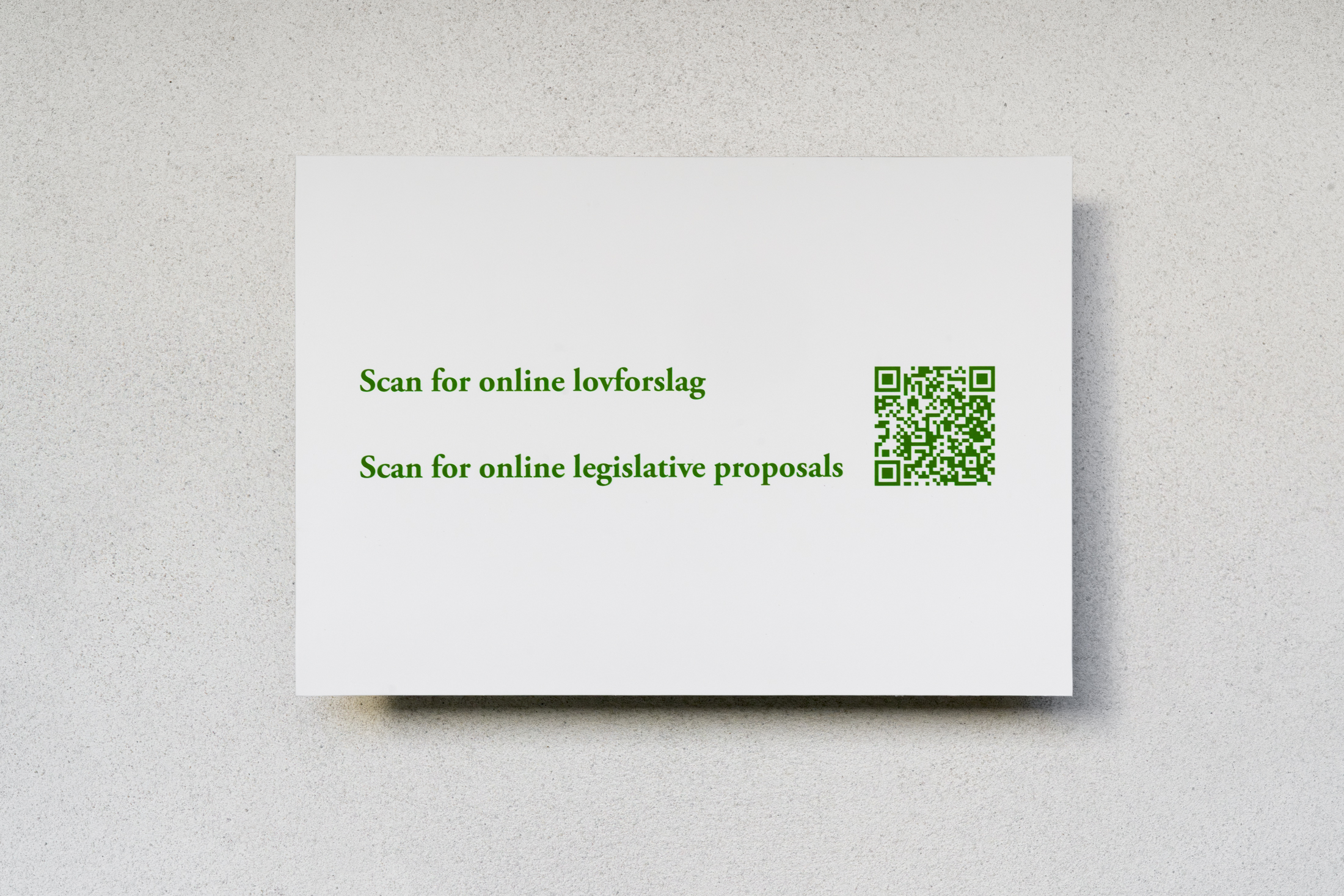
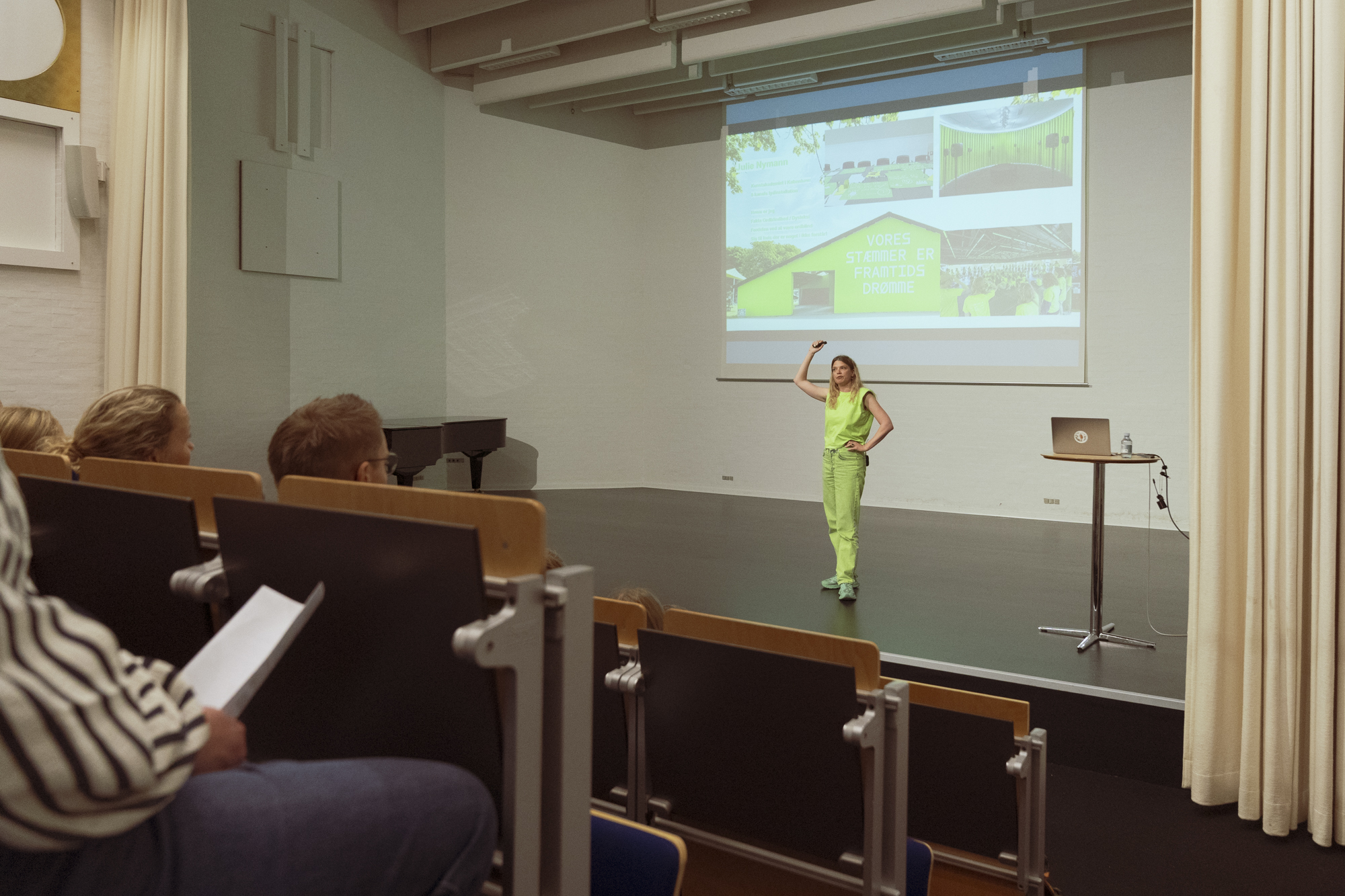
CREDITS
artist
Julie Nymann
text editor
Helle Harnisch
Ida Vestergaard Øyan
graphic designer
Kasper Aavad
translator
Ami Frost
thank you
Andrea Diermayr, Lars Bo Henriksen, Louise Rytter, Silas Emmery, Vibeke Rasmussen and all the teachers I had the pleasure of engaging with.
Julie Nymann
text editor
Helle Harnisch
Ida Vestergaard Øyan
graphic designer
Kasper Aavad
translator
Ami Frost
thank you
Andrea Diermayr, Lars Bo Henriksen, Louise Rytter, Silas Emmery, Vibeke Rasmussen and all the teachers I had the pleasure of engaging with.